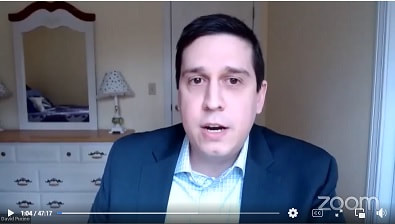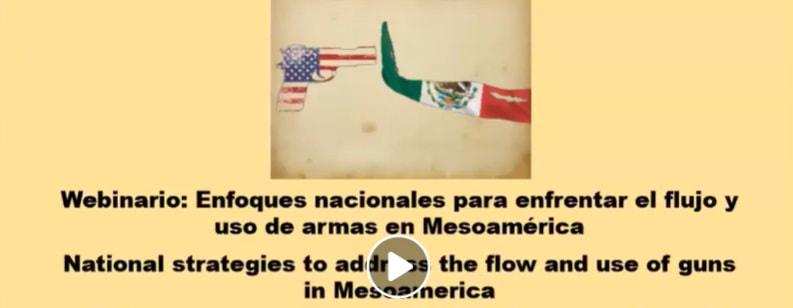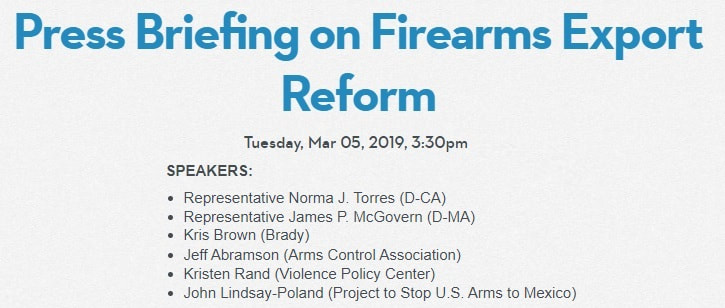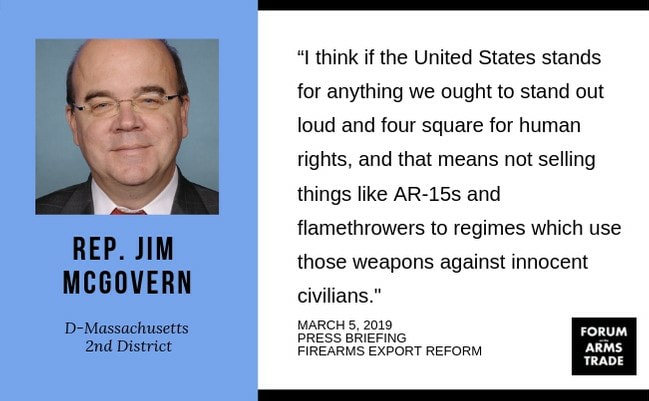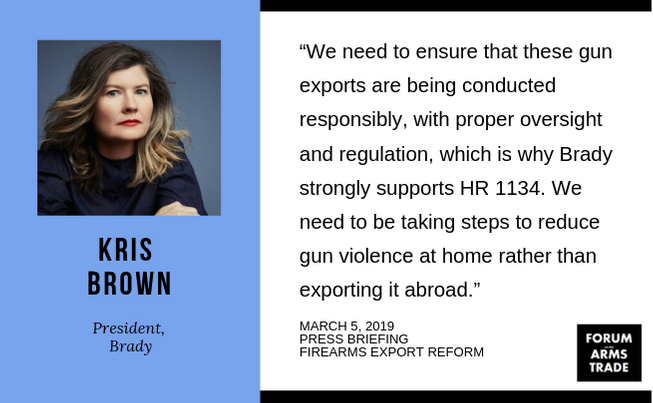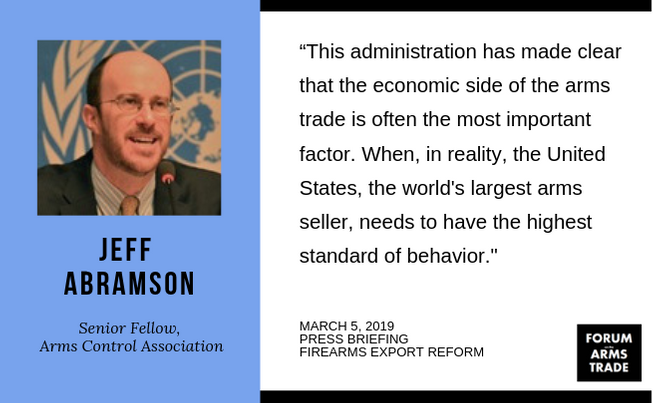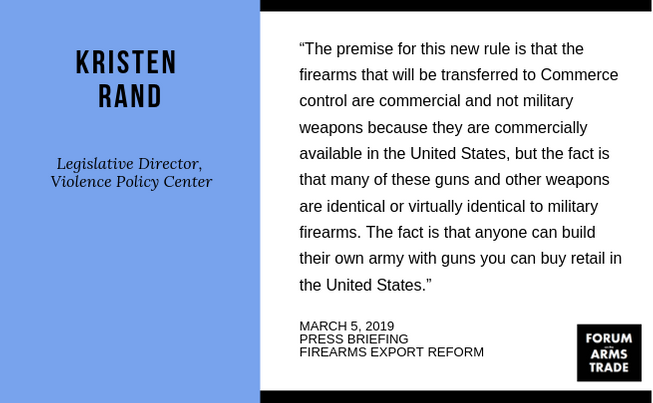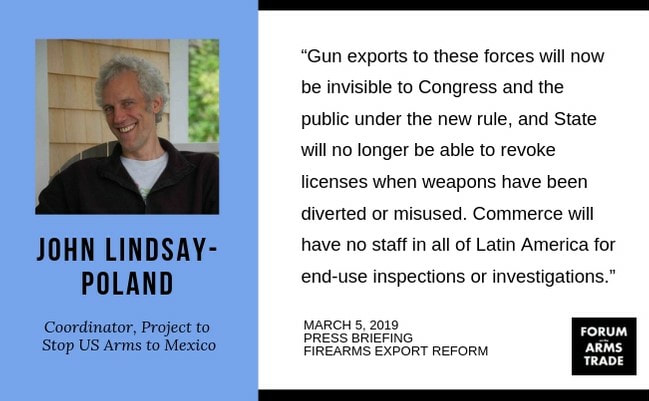Jump to event archive.
EVENT ARCHIVE
2024
- June 4, 5, 6 - Annual conference: White Arms Trade Restraint in a Time of Expanded Conflict?
- February 29 - Accountability for Gun Violence: What’s Next In Mexico’s Case Against U.S. Gun Manufacturers?
- January 16 - Arming the War in Israel-Palestine: Legal Considerations
- November 13 - Press briefing - Implications of Arming the Israel-Palestine Conflict
- October 5 - Critical Perspectives on U.S. Concessions for the Abraham Accords: Saudi Arabia-Israel-United States
- August 15 - Learning from Niger: U.S. Security Assistance and Training
- February 16, 21 - Annual Conference 2023
- September 7 - The ATT and the Arms Trade: Trends in Financial and Corporate Responsibility
- August 30 - War in Ukraine and Impact on Arms Trade and Human Rights: the Middle East
- August 18 - War in Ukraine and Impact on Arms Trade and Militarism: South East Europe and the Black Sea Region
- April 12, 14, 20 - Annual Conference 2022
- March 10 - Legal Approaches to Reduce Gun Violence: Amicus Briefs and the Mexican Lawsuit
- October 21 - Evolving Financial Approaches to Disarmament and Weapons
- September 21 - Learning From The Afghanistan Experience: Re-Assessing U.S. Weapon and Security Assistance
- August 18 - Legal Approaches to Reduce Gun Violence: Mexican and U.S. Strategies
- July 21 - Exploration of Arms Reduction and Jobs I: Divestment and Transition
- June 25 - Improving Oversight and Transparency in U.S. Small Arms Trade
- May 3 - Biden and Congress at 100 Days - Assessing Arms Trade Policy
- March 3 - Arms Sales to Conflict Zones
- February 17 - Biden's Arms Sales Review: What's Needed Next
- January 12 - Annual Conference - Advancing More Responsible Arms Trade Policy
- November 19 - Moving Forward Via Humanitarian Disarmament
- September 24 - Moving Beyond Pandemic Arms Sales
- July 16 - Local Solutions to a Hemispheric Challenge (part of series)
- June 25 - The flow of U.S. guns and violence against women in Mexico and Central America (part of series)
- May 28 - Regional strategies to stop the flow and use of firearms in Mesoamerica (part of series)
- May 20 - U.S. Arms Sales in the Time of COVID-19
- May 14 - Arms Trafficking in the Americas (part of series)
- April 21 - Gun Violence in Mexico and Central America: Facing the Challenges and the Path to Solutions (part of series)
- February 19 - U.S. Foreign Policy Moving Forward: Perspectives from the Middle East
- February 6 - What Do High Schoolers Have to Say About Arms Sales: Special Debate Event
- January 14 - Annual Conference - Beyond the Headlines: Redefining Responsibility in the Arms Trade
- May 14 - Progress Without U.S. Leadership? Humanitarian Disarmament
- March 5 - Press Briefing on Firearms Export Control
- Oct 13-14 - Humanitarian Disarmament Forum:Humanitarian Disarmament Tools (New York City)
- May 22 - Annual Conference - Taking Aim: A Closer Look at the Global Arms Trade
- April 5 - Jobs, Security, and Human Rights: Striking a Balance in U.S. Arms Export Policy
- November 2 - Tackling Corruption in the Arms Trade
- May 3 - Media Briefing - Trends in U.S. Foreign Military Training
- April 5 - Corruption, Jobs and the Arms Trade: Indefensible Book Launch and Panel
- February 28- The Global Arms Trade: Assessing Trends and Future Outlook
- April 22 - What to Control: Regulating U.S. Sales of Private Military Contractors Abroad
- April 6 - Global Military Spending and the Arms Trade: Trends & Implications
- October 20 - Crisis in Yemen - Humanitarians & Security Consequences of Military Support to the Region
- May 19 - Media Briefing - Middle East Security Assistance & Report Pre-Release Information
- April 23 - Assessing Proposed U.S. Security Assistance to Africa, Latin America and the Middle East
- April 7 - Tracking Arms in Conflict: Lessons from Syria & Iraq
- March 16 - Global Arms Trade, Recent Trends & Looking Ahead

Visit our conference page for full details including videos and our conference report.
- June 4: Moving Beyond Rhetoric: Overcoming Challenges to Better U.S. Policy
- June 5: Are Legal and Human Rights Challenges at a Tipping Point in Changing the Arms Trade?
- June 6: The Ongoing Humanitarian Disarmament Agenda
Accountability for Gun Violence: What’s Next In Mexico’s Case Against U.S. Gun Manufacturers?

DATE: Thursday, February 29, 2024
TIME: 10:30-11:45 AM EST
LOCATION: virtual webinar (via Zoom)
See EVENT recap, with resources and video guide.
In January, a federal appeals panel in Massachusetts ruled that a civil lawsuit filed by Mexico against U.S. gun manufacturers for aiding and abetting illegal sales could proceed, reversing a lower court that had dismissed the case. The lawsuit has important implications not only for armed violence in the United States and Mexico, but also for European and other manufacturers who produce weapons in the U.S.. Moreover, a hearing took place February 22 in a separate case filed by Mexico in Arizona against gun retailers.
This timely event will explore the recent decision in Massachusetts as well as developments in the Arizona case. Fadia Ibrahim will introduce the litigation from the perspective of the Mexican government, both in terms of Mexico’s claims and its alleged harm. Carlos Pérez Ricart will outline the stakes of the lawsuits from the security perspective in Mexico and the United States. Jonathan Lowy will discuss the Circuit Court’s decision and outline next steps, including the implications that discovery might provide for additional legal avenues in the United States. Leila Sadat will explore how evidence presented could feed into further U.S. litigation, including possible human rights-based claims. León Castellanos-Jankiewicz will moderate and add perspectives from international and European law.
Discussion may be in English or Spanish, with simultaneous interpretation. This event is co-organized by the Forum on the Arms Trade and the Asser Institute for International and European Law. The Forum and the Institute provide a platform for expert views but do not themselves take positions.
Panelists:
TIME: 10:30-11:45 AM EST
LOCATION: virtual webinar (via Zoom)
See EVENT recap, with resources and video guide.
In January, a federal appeals panel in Massachusetts ruled that a civil lawsuit filed by Mexico against U.S. gun manufacturers for aiding and abetting illegal sales could proceed, reversing a lower court that had dismissed the case. The lawsuit has important implications not only for armed violence in the United States and Mexico, but also for European and other manufacturers who produce weapons in the U.S.. Moreover, a hearing took place February 22 in a separate case filed by Mexico in Arizona against gun retailers.
This timely event will explore the recent decision in Massachusetts as well as developments in the Arizona case. Fadia Ibrahim will introduce the litigation from the perspective of the Mexican government, both in terms of Mexico’s claims and its alleged harm. Carlos Pérez Ricart will outline the stakes of the lawsuits from the security perspective in Mexico and the United States. Jonathan Lowy will discuss the Circuit Court’s decision and outline next steps, including the implications that discovery might provide for additional legal avenues in the United States. Leila Sadat will explore how evidence presented could feed into further U.S. litigation, including possible human rights-based claims. León Castellanos-Jankiewicz will moderate and add perspectives from international and European law.
Discussion may be in English or Spanish, with simultaneous interpretation. This event is co-organized by the Forum on the Arms Trade and the Asser Institute for International and European Law. The Forum and the Institute provide a platform for expert views but do not themselves take positions.
Panelists:
- Fadia Ibrahim, Director of International Litigation, Ministry of Foreign Affairs, Mexico
- Jonathan Lowy, Founder and President, Global Action on Gun Violence
- Carlos Pérez Ricart, Professor of International Relations, Center for Research and Teaching in Economics (CIDE, Mexico)
- Leila Sadat, James Carr Professor of International Criminal Law, Washington University and Fellow, Schell Center for Human Rights, Yale Law School
- Moderator: León Castellanos-Jankiewicz, Senior Researcher, Asser Institute for International and European Law, The Hague
Acceso a la justicia por violencia armada:
¿Qué sigue en la demanda de México contra los fabricantes de armas en EE. UU.?
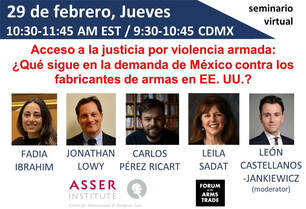
FECHA: Jueves, 29 de febrero de 2024
HORA: 10:30-11:45 AM (EST) y 9:30-10:45 (CDMX)
UBICACIÓN: seminario virtual (a través de Zoom)
En enero, una corte de apelaciones en Massachusetts dictaminó que una demanda civil presentada por México contra fabricantes de armas de fuego de EE. UU. por complicidad en ventas ilegales puede continuar. La corte reviertió la decisión de un tribunal inferior que había desestimado el caso. La demanda tiene importantes implicaciones, no solamente para la violencia armada en Estados Unidos y México, sino también para fabricantes europeos. Asimismo, hubo una audiencia el 22 de febrero en un caso separado presentado por México en las cortes de Arizona contra vendedores de armas de fuego.
Este evento explorará la reciente decisión en Massachusetts, así como el caso pendiente en Arizona. Fadia Ibrahim presentará el litigio desde la perspectiva del gobierno mexicano, las pretensiones de México y los daños alegados. Carlos Pérez Ricart delineará las implicaciones de los litigios bajo una perspectiva de la seguridad en México y Estados Unidos. Jonathan Lowy hablará sobre la decisión del Tribunal de Massachusetts y describirá los pasos a seguir en el procedimiento, incluidas las implicaciones que la presentación de evidencia podría generar para demandas adicionales en Estados Unidos. Leila Sadat hablará sobre cómo la evidencia presentada durante el juicio podría dar pie a nuevos litigios en EE.UU., en especial en lo que respecta a la protección de los derechos humanos. León Castellanos-Jankiewicz moderará y aportará perspectivas en materia de derecho internacional y europeo.
Las presentaciones seránen inglés y español, con interpretación simultánea. Este evento es coorganizado por el Foro sobre Comercio de Armas (Forum on the Arms Trade) y el Asser Institute for International and European Law. El Foro y el Instituto ofrecen una plataforma para opiniones de expertos, pero no adoptan posiciones por sí mismos.
Panelistas:
* Fadia Ibrahim, Directora de Litigios Internacionales, Secretaría de Relaciones Exteriores, México
* Jonathan Lowy, Fundador y Presidente, Acción Global contra la Violencia Armada
* Carlos Pérez Ricart, Profesor de Relaciones Internacionales, Centro de Investigación y Docencia Económicas (CIDE, México)
* Leila Sadat, Profesora de la Cátedra James Carr en Derecho Penal Internacional, Washington University y Fellow, Schell Center for Human Rights, Yale Law School
* Moderador: León Castellanos-Jankiewicz, Investigador Senior, Asser Institute for International and European Law, La Haya
HORA: 10:30-11:45 AM (EST) y 9:30-10:45 (CDMX)
UBICACIÓN: seminario virtual (a través de Zoom)
En enero, una corte de apelaciones en Massachusetts dictaminó que una demanda civil presentada por México contra fabricantes de armas de fuego de EE. UU. por complicidad en ventas ilegales puede continuar. La corte reviertió la decisión de un tribunal inferior que había desestimado el caso. La demanda tiene importantes implicaciones, no solamente para la violencia armada en Estados Unidos y México, sino también para fabricantes europeos. Asimismo, hubo una audiencia el 22 de febrero en un caso separado presentado por México en las cortes de Arizona contra vendedores de armas de fuego.
Este evento explorará la reciente decisión en Massachusetts, así como el caso pendiente en Arizona. Fadia Ibrahim presentará el litigio desde la perspectiva del gobierno mexicano, las pretensiones de México y los daños alegados. Carlos Pérez Ricart delineará las implicaciones de los litigios bajo una perspectiva de la seguridad en México y Estados Unidos. Jonathan Lowy hablará sobre la decisión del Tribunal de Massachusetts y describirá los pasos a seguir en el procedimiento, incluidas las implicaciones que la presentación de evidencia podría generar para demandas adicionales en Estados Unidos. Leila Sadat hablará sobre cómo la evidencia presentada durante el juicio podría dar pie a nuevos litigios en EE.UU., en especial en lo que respecta a la protección de los derechos humanos. León Castellanos-Jankiewicz moderará y aportará perspectivas en materia de derecho internacional y europeo.
Las presentaciones seránen inglés y español, con interpretación simultánea. Este evento es coorganizado por el Foro sobre Comercio de Armas (Forum on the Arms Trade) y el Asser Institute for International and European Law. El Foro y el Instituto ofrecen una plataforma para opiniones de expertos, pero no adoptan posiciones por sí mismos.
Panelistas:
* Fadia Ibrahim, Directora de Litigios Internacionales, Secretaría de Relaciones Exteriores, México
* Jonathan Lowy, Fundador y Presidente, Acción Global contra la Violencia Armada
* Carlos Pérez Ricart, Profesor de Relaciones Internacionales, Centro de Investigación y Docencia Económicas (CIDE, México)
* Leila Sadat, Profesora de la Cátedra James Carr en Derecho Penal Internacional, Washington University y Fellow, Schell Center for Human Rights, Yale Law School
* Moderador: León Castellanos-Jankiewicz, Investigador Senior, Asser Institute for International and European Law, La Haya
Arming the War in Israel-Palestine: Legal Considerations
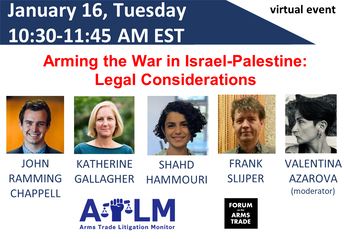
DATE: Tuesday, January 16
TIME: 10:30-11:45 AM EST
LOCATION: virtual webinar (via Zoom)
See EVENT recap, with resources and recording guide.
As the Israel-Gaza conflict escalated last year, many civil society organizations and countries called for a halt to all weapons exports to the conflict. In some western countries, for example, legal challenges were filed asking for transparency in or a stop to the provision of weapons to Israel. This event provides an opportunity to learn about and discuss some of these legal challenges, framed within the broader context of increased litigation around arms transfers in recent years.
In particular, Frank Slijper will discuss an ongoing challenge to the Netherlands’ supply of F-35 parts to Israel. Katherine Gallagher will discuss a case filed in the United States arguing that the Biden administration failed to prevent and is complicit in Israel's unfolding genocide against the Palestinian population in Gaza, which calls for a prohibition on further U.S. assistance. John Ramming Chappell will discuss other legal considerations in the U.S. context. Shahd Hammouri will discuss the intersection of arms with cases at the International Court of Justice, the International Criminal Court, and other regional mechanisms. Valentina Azarova will moderate and raise broader trends related to arms trade litigation.
This event is co-organized by the Forum on the Arms Trade and the Arms Trade Litigation Monitor. The Forum provides a platform for expert views but does not itself take positions.
Panelists:
TIME: 10:30-11:45 AM EST
LOCATION: virtual webinar (via Zoom)
See EVENT recap, with resources and recording guide.
As the Israel-Gaza conflict escalated last year, many civil society organizations and countries called for a halt to all weapons exports to the conflict. In some western countries, for example, legal challenges were filed asking for transparency in or a stop to the provision of weapons to Israel. This event provides an opportunity to learn about and discuss some of these legal challenges, framed within the broader context of increased litigation around arms transfers in recent years.
In particular, Frank Slijper will discuss an ongoing challenge to the Netherlands’ supply of F-35 parts to Israel. Katherine Gallagher will discuss a case filed in the United States arguing that the Biden administration failed to prevent and is complicit in Israel's unfolding genocide against the Palestinian population in Gaza, which calls for a prohibition on further U.S. assistance. John Ramming Chappell will discuss other legal considerations in the U.S. context. Shahd Hammouri will discuss the intersection of arms with cases at the International Court of Justice, the International Criminal Court, and other regional mechanisms. Valentina Azarova will moderate and raise broader trends related to arms trade litigation.
This event is co-organized by the Forum on the Arms Trade and the Arms Trade Litigation Monitor. The Forum provides a platform for expert views but does not itself take positions.
Panelists:
- Frank Slijper, Arms Trade Project lead, PAX (Netherlands)
- Katherine Gallagher, Senior Staff Attorney, Center for Constitutional Rights (United States)
- John Ramming Chappell, Advocacy & Legal Fellow, U.S. Program, Center for Civilians in Conflict (United States)
- Dr. Shahd Hammouri, Lecturer in International Law, University of Kent; non-resident Fellow, Al Haq for Applied International Law (Palestine, Jordan, United Kingdom)
- Dr Valentina Azarova, co-founder, Emergent Justice Collective; co-creator, Arms Trade Litigation Monitor; part of Feminist Autonomous Centre for research (FAC research) - moderator
Press briefing - Implications of Arming the Israel-Palestine Conflict
Monday, November 13 at 1:30PM EST (virtual)
Listen to the recording - click here
As the Israel-Gaza conflict continues to escalate, leading to devastating casualties,the U.S. Congress is considering the Biden administration’s $14 billion request for additional weapons for Israel. Leading human rights organizations are calling for a suspension of arms transfers to parties of the conflict, at times focused on specific weapons systems, and at least one U.S. official has resigned. Faith groups are also pressing for a change in the U.S. approach. This press briefing offered different perspectives on the conflict and U.S. arms transfers to Israel. Participants provided rationale for their own or their organization’s calls on the U.S. government and share other recent findings. This briefing was for media only.
Speakers:
This event was on the record and an audio recording made available afterwards. It was organized by the Forum on the Arms Trade, which provides a platform for expert views but does not itself take positions. Comments may be attributed to the speakers and, unless otherwise indicated, do not necessarily indicate endorsement of comments by other speakers. (Members of the media who speak on the recording in order to ask questions should not be quoted.)
During the briefing, the following resources were shared:
Listen to the recording - click here
Listen to the recording - click here
As the Israel-Gaza conflict continues to escalate, leading to devastating casualties,the U.S. Congress is considering the Biden administration’s $14 billion request for additional weapons for Israel. Leading human rights organizations are calling for a suspension of arms transfers to parties of the conflict, at times focused on specific weapons systems, and at least one U.S. official has resigned. Faith groups are also pressing for a change in the U.S. approach. This press briefing offered different perspectives on the conflict and U.S. arms transfers to Israel. Participants provided rationale for their own or their organization’s calls on the U.S. government and share other recent findings. This briefing was for media only.
Speakers:
- Josh Paul - former Director, State Department Office of Congressional and Public Affairs
- Sarah Yager - Washington Director, Human Rights Watch
- Amanda Klasing - National Director of Government Relations and Advocacy at Amnesty International USA
- Rev. Dr. Mae Elise Cannon, Executive Director, Churches for Middle East Peace (CMEP)
This event was on the record and an audio recording made available afterwards. It was organized by the Forum on the Arms Trade, which provides a platform for expert views but does not itself take positions. Comments may be attributed to the speakers and, unless otherwise indicated, do not necessarily indicate endorsement of comments by other speakers. (Members of the media who speak on the recording in order to ask questions should not be quoted.)
During the briefing, the following resources were shared:
- Josh Paul, "Security Assistance and Arms Transfers: Human Rights Frameworks and Recommendations for Strengthening," Institute for Middle East Understanding, November 10, 2023.
- Human Rights Watch - call for arms suspension to Israel and Palestine (November 6)
- Resources from Amnesty International USA
- Letter to President Biden, from Churches from Middle East Peace (CMEP) and thirty American Christian leaders called calling for support to an immediate ceasefire, de-escalation, and restraint by all involved (November 9)
- Forum on the Arms Trade resource page on U.S. arms transfers to Israel
- Oxfam America briefing on 155mm shell transfers (October 30)
- OCHA reporting indicating 11k+ deaths, including 4,506 children
- John Ramming Chappell, Annie Shiel, Seth Binder, Elias Yousif, Bill Monahan and Amanda Klasing, "Law and Policy Guide to US Arms Transfers to Israel," Just Security, November 8, 2023.
- President Biden's request letter for supplemental funding, including FMF waiver, see page 43: That any congressional notification requirement applicable to funds made available under this heading for Israel may be waived if a determination is made that extraordinary circumstances exist that impact the national security of the United States.
- November 1 letter to the President Biden from four members of Congress
Listen to the recording - click here
Critical Perspectives on U.S. Concessions for the Abraham Accords: Saudi Arabia-Israel-United States
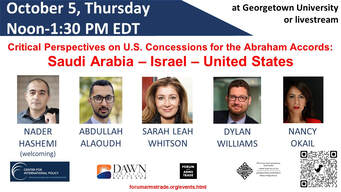
DATE: Thursday, October 5, 2023
TIME: noon-1:30 pm
LOCATION: Rafik B. Hariri Building, Fourth floor, Fisher Colloquium, Georgetown University (and livestreamed)
SEE EVENT RECAP As widely reported, the Biden administration appears to be pursuing a grand bargain in the Middle East to normalize relations between Saudi Arabia and Israel that may come with new defense commitments from the United States, significant transfers of arms and other security assistance, and the development of uranium enrichment and construction of a nuclear plant for Saudi Arabia. Bipartisan Abraham Accords caucuses in both the House and Senate have formed in recent years aiming to expand the Accords approach that have seen the United States offer legal, political and military concessions to MENA governments, often ignoring repression and severe human rights concerns.
While the details of what an ultimate agreement might look like remain unclear, there is a need to be clear on what the ramifications of the approach might be with regards to Israel and Saudi Arabia. Those who see more danger than positives need to be included in the conversation, to talk not only about the harm of this approach to U.S. interests in the region, but also to those of citizens within it. This event aims to do that, bringing together experts from and focused on the countries in the region.
This event is co-organized by the Center for International Policy, Democracy for the Arab World Now (DAWN), and the Forum on the Arms Trade, and hosted by the Center for Contemporary Arab Studies at the Walsh School of Foreign Service at Georgetown University.
Welcome: Nader Hashemi, Director, Alwaleed Center for Muslim-Christian Understanding at the Edmund A. Walsh School of Foreign Service, Georgetown University
Panelists:
TIME: noon-1:30 pm
LOCATION: Rafik B. Hariri Building, Fourth floor, Fisher Colloquium, Georgetown University (and livestreamed)
SEE EVENT RECAP As widely reported, the Biden administration appears to be pursuing a grand bargain in the Middle East to normalize relations between Saudi Arabia and Israel that may come with new defense commitments from the United States, significant transfers of arms and other security assistance, and the development of uranium enrichment and construction of a nuclear plant for Saudi Arabia. Bipartisan Abraham Accords caucuses in both the House and Senate have formed in recent years aiming to expand the Accords approach that have seen the United States offer legal, political and military concessions to MENA governments, often ignoring repression and severe human rights concerns.
While the details of what an ultimate agreement might look like remain unclear, there is a need to be clear on what the ramifications of the approach might be with regards to Israel and Saudi Arabia. Those who see more danger than positives need to be included in the conversation, to talk not only about the harm of this approach to U.S. interests in the region, but also to those of citizens within it. This event aims to do that, bringing together experts from and focused on the countries in the region.
This event is co-organized by the Center for International Policy, Democracy for the Arab World Now (DAWN), and the Forum on the Arms Trade, and hosted by the Center for Contemporary Arab Studies at the Walsh School of Foreign Service at Georgetown University.
Welcome: Nader Hashemi, Director, Alwaleed Center for Muslim-Christian Understanding at the Edmund A. Walsh School of Foreign Service, Georgetown University
Panelists:
- Abdullah Alaoudh, Saudi Director for the Freedom Initiative and Secretary-General of the National Assembly Party of Saudi Arabia
- Sarah Leah Whitson, Executive Director, Democracy for the Arab World Now (DAWN)
- Dylan Williams, Vice President for Government Affairs, Center for International Policy
- Nancy Okail, President and CEO, Center for International Policy (moderator)
Learning from Niger: U.S. Security Assistance and Training
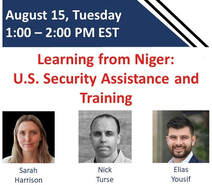
Virtual event
DATE: Tuesday, August 15, 2023
TIME: 1:00-2:00 PM EST
SEE EVENT RECAP with suggested resources and recommendations. Click here.
The military takeover of Niger threatens to exacerbate suffering and instability in the country and region. It has also been supported by some who have been trained by the United States, again bringing attention to the ways in which the U.S. provides security assistance. This has similarly raised questions about U.S. law as relates to coups, and the meaning of such designations.
Join an investigative reporter, former Defense Department legal counselor, and U.S. security assistance expert in this webinar for a discussion of the U.S. involvement in training of military leaders who have gone on to replace their governments, the limitations placed on further U.S. assistance whether called a coup or not, the challenges of making decisions of which countries to aid especially as relates to training, and recommendations for improving those decisions and for much greater transparency in the future.
Panelists:
This event is hosted by the Forum on the Arms Trade.
DATE: Tuesday, August 15, 2023
TIME: 1:00-2:00 PM EST
SEE EVENT RECAP with suggested resources and recommendations. Click here.
The military takeover of Niger threatens to exacerbate suffering and instability in the country and region. It has also been supported by some who have been trained by the United States, again bringing attention to the ways in which the U.S. provides security assistance. This has similarly raised questions about U.S. law as relates to coups, and the meaning of such designations.
Join an investigative reporter, former Defense Department legal counselor, and U.S. security assistance expert in this webinar for a discussion of the U.S. involvement in training of military leaders who have gone on to replace their governments, the limitations placed on further U.S. assistance whether called a coup or not, the challenges of making decisions of which countries to aid especially as relates to training, and recommendations for improving those decisions and for much greater transparency in the future.
Panelists:
- Sarah Harrison, Senior Analyst, U.S. Program, International Crisis Group
- Nick Turse, contributing writer, The Intercept
- Elias Yousif, Research Analyst, Conventional Defense Program, Stimson Center
This event is hosted by the Forum on the Arms Trade.
Annual Conference 2023
The 2023 annual conference took place on two separate days, with a virtual session on February 16 and two virtual sessions on February 21.
DOWNLOAD the conference report for assessments, recommendations and suggested resources from panelists.
DOWNLOAD the conference report for assessments, recommendations and suggested resources from panelists.
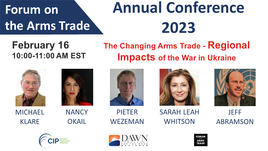
Virtual event
DATE: Thursday, February 16, 2023
TIME: 10:00-11:00 AM EST
The Changing Arms Trade - Regional Impacts of the War in Ukraine
The war in Ukraine has implications not only in Europe, but throughout the world, as trade in weaponry increases because of the conflict. This panel takes up some of the regional dynamics with an eye on what’s (not) happening to restraint in the arms trade, and what should be done moving forward. Pieter Wezeman will examine evolving European arms transfers policies toward Ukraine in comparison of policies to other countries. Nancy Okail and Sarah Leah Whitson will share insight into the Middle East, looking not just at major suppliers of weapons to the region, but also the weapons production activities and exports from countries in the region and the implications that will have on peace dynamics. As analysts increasingly look to the Ukraine war for lessons about potential conflict over Taiwan, Michael Klare takes on the role of planned and potential weapons transfers in the rising tension between China and the United States. This session is co-sponsored by the Center for International Policy, Democracy for the Arab World Now (DAWN), and the Forum on the Arms Trade.
Panelists
DATE: Thursday, February 16, 2023
TIME: 10:00-11:00 AM EST
The Changing Arms Trade - Regional Impacts of the War in Ukraine
The war in Ukraine has implications not only in Europe, but throughout the world, as trade in weaponry increases because of the conflict. This panel takes up some of the regional dynamics with an eye on what’s (not) happening to restraint in the arms trade, and what should be done moving forward. Pieter Wezeman will examine evolving European arms transfers policies toward Ukraine in comparison of policies to other countries. Nancy Okail and Sarah Leah Whitson will share insight into the Middle East, looking not just at major suppliers of weapons to the region, but also the weapons production activities and exports from countries in the region and the implications that will have on peace dynamics. As analysts increasingly look to the Ukraine war for lessons about potential conflict over Taiwan, Michael Klare takes on the role of planned and potential weapons transfers in the rising tension between China and the United States. This session is co-sponsored by the Center for International Policy, Democracy for the Arab World Now (DAWN), and the Forum on the Arms Trade.
Panelists
- Michael Klare, Senior Visiting Fellow, Arms Control Association
- Nancy Okail, President and CEO, Center for International Policy
- Pieter Wezeman, Senior Researcher, Stockholm International Peace Research Institute (SIPRI)
- Sarah Leah Whitson, Executive Director, Democracy for the Arab World Now (DAWN)
- Jeff Abramson, Senior Fellow, Arms Control Association and Director, Forum on the Arms Trade (moderator)
Virtual event hosted by the Stimson Center
DATE: Tuesday, February 21, 2023
TIME: 2:00-4:10 PM EST
DATE: Tuesday, February 21, 2023
TIME: 2:00-4:10 PM EST
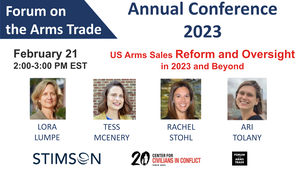
First Session (2:00-3:00PM EST)
US Arms Sales Reform and Oversight in 2023 and Beyond
With two years remaining in the Biden administration and a changed political landscape of the 118th Congress, advocates, policymakers, and legislators alike face both challenges and opportunities in security assistance reform. Join the Forum on the Arms Trade, Center for Civilians in Conflict (CIVIC), and the Stimson Center for a discussion of trends in security assistance and arms sales and opportunities for reform and oversight this year and beyond.
US Arms Sales Reform and Oversight in 2023 and Beyond
With two years remaining in the Biden administration and a changed political landscape of the 118th Congress, advocates, policymakers, and legislators alike face both challenges and opportunities in security assistance reform. Join the Forum on the Arms Trade, Center for Civilians in Conflict (CIVIC), and the Stimson Center for a discussion of trends in security assistance and arms sales and opportunities for reform and oversight this year and beyond.
- Lora Lumpe, Chief Executive Officer, Quincy Institute
- Tess McEnery, Executive Director, Project on Middle East Democracy
- Rachel Stohl, Director, Conventional Defense Program, and Vice President, Stimson Center
- Ari Tolany, United States Program Manager, Center for Civilians in Conflict (CIVIC) (moderator)
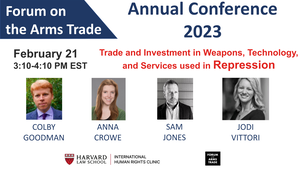
Second Session (3:10-4:10 PM EST)
Trade and Investment in Weapons, Technology, and Services Used in Repression
While discussion of the arms trade often focuses on kinetic weapons systems, there are many other weapons, technologies, and services that are traded that impact on conflict and repression, but that fall through a variety of gaps. This panel takes a look into developments to control such trade by multiple different actors. Colby Goodman will explore the increasing role of private military and security companies (PMSCs) and efforts to define and regulate their use internationally. Sam Jones will examine the challenges investors face in revising their investment screens to consider modern weaponry and its critical components, including those with dual-use capability (e.g., targeted and mass surveillance technologies, lethal autonomous weapon systems, drones, semiconductors). Anna Crowe will discuss a growing initiative to create a treaty to regulate the trade in law enforcement equipment to help prevent torture and other ill-treatment and the lessons that can be learned from the Arms Trade Treaty. Jodi Vittori will moderate the discussion, bringing in her expertise on anti-corruption efforts that touch upon many of these initiatives. This session is co-organized by Harvard Law School’s International Human Rights Clinic and the Forum on the Arms Trade.
Panelists
Trade and Investment in Weapons, Technology, and Services Used in Repression
While discussion of the arms trade often focuses on kinetic weapons systems, there are many other weapons, technologies, and services that are traded that impact on conflict and repression, but that fall through a variety of gaps. This panel takes a look into developments to control such trade by multiple different actors. Colby Goodman will explore the increasing role of private military and security companies (PMSCs) and efforts to define and regulate their use internationally. Sam Jones will examine the challenges investors face in revising their investment screens to consider modern weaponry and its critical components, including those with dual-use capability (e.g., targeted and mass surveillance technologies, lethal autonomous weapon systems, drones, semiconductors). Anna Crowe will discuss a growing initiative to create a treaty to regulate the trade in law enforcement equipment to help prevent torture and other ill-treatment and the lessons that can be learned from the Arms Trade Treaty. Jodi Vittori will moderate the discussion, bringing in her expertise on anti-corruption efforts that touch upon many of these initiatives. This session is co-organized by Harvard Law School’s International Human Rights Clinic and the Forum on the Arms Trade.
Panelists
- Colby Goodman, Senior Researcher, Transparency International Defence and Security
- Anna Crowe, Associate Director, International Human Rights Clinic, Harvard Law School
- Sam Jones, President, Heartland Initiative
- Jodi Vittori, Professor and Co-Chair, Global Politics and Security Program, Georgetown University (moderator)
The ATT and the Arms Trade: Trends in Financial and Corporate Responsibility
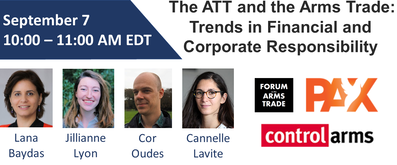
DATE: Wednesday, September 7
TIME: 10:00-11:00AM EDT
LOCATION: Virtual
See event recap
The Arms Trade Treaty lays out the responsibility of states in dealing with arms exports. While those states agree to guarantee export licensing regimes for military goods that respond to key risks listed in the ATT, many financial institutions are now also seeking to avoid these risks and companies applying for such licenses have their own responsibility to consider them.
Many of the emerging trends in financial and corporate approaches to the arms trade and the ATT are related today to broad human rights standards (such as the UN Guiding Principles and the OECD Guidelines for multinational enterprises) that require companies to conduct human rights due diligence (HRDD) for their business dealings. Advocates are increasingly pointing to the need for enhanced HRDD in cases dealing with conflict zones, which would also apply to arms producers whose weapons find their way into conflicts. Business partners of arms producers, such as their financiers, are also developing policies to avoid harm-causing investments.
The event features a presentation by Dutch peace organization PAX, whose recent research found that despite investment policies acknowledging the risks involved, the largest fifteen banks in Europe invest 87.7 billion euro in arms companies that sell weapons to states involved in human rights violations or armed conflict. Investor Advocates for Social Justice will talk about recent and upcoming shareholder resolutions that may change the landscape for arms producers. And the American Bar Association Center for Human Rights will discuss recently published findings and recommendations on the responsibility of arms manufacturers to implement human rights due diligence programs.
This event is co-hosted by the Forum on the Arms Trade, Control Arms, and PAX.
Panelists
TIME: 10:00-11:00AM EDT
LOCATION: Virtual
See event recap
The Arms Trade Treaty lays out the responsibility of states in dealing with arms exports. While those states agree to guarantee export licensing regimes for military goods that respond to key risks listed in the ATT, many financial institutions are now also seeking to avoid these risks and companies applying for such licenses have their own responsibility to consider them.
Many of the emerging trends in financial and corporate approaches to the arms trade and the ATT are related today to broad human rights standards (such as the UN Guiding Principles and the OECD Guidelines for multinational enterprises) that require companies to conduct human rights due diligence (HRDD) for their business dealings. Advocates are increasingly pointing to the need for enhanced HRDD in cases dealing with conflict zones, which would also apply to arms producers whose weapons find their way into conflicts. Business partners of arms producers, such as their financiers, are also developing policies to avoid harm-causing investments.
The event features a presentation by Dutch peace organization PAX, whose recent research found that despite investment policies acknowledging the risks involved, the largest fifteen banks in Europe invest 87.7 billion euro in arms companies that sell weapons to states involved in human rights violations or armed conflict. Investor Advocates for Social Justice will talk about recent and upcoming shareholder resolutions that may change the landscape for arms producers. And the American Bar Association Center for Human Rights will discuss recently published findings and recommendations on the responsibility of arms manufacturers to implement human rights due diligence programs.
This event is co-hosted by the Forum on the Arms Trade, Control Arms, and PAX.
Panelists
- Lana Baydas, Senior Program Manager, ABA Center for Human Rights
- Jillianne Lyon, Program Director, Investor Advocates for Social Justice
- Cor Oudes, program lead at PAX
- Cannelle Lavite, Co-Director, Business and Human Rights, European Center for Constitutional and Human Rights (moderator)
War in Ukraine and Impact on Arms Trade and Human Rights: the Middle East
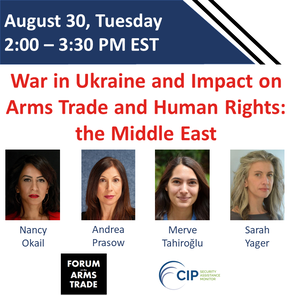
DATE: Tuesday, August 30, 2022
TIME: 2:00-3:30 PM EST
LOCATION: Virtual
See event recap
This event, part of a series exploring the global impacts of war in Ukraine, examines the relationship of countries in the Middle East to that war and ongoing arms trade and human rights developments in the region.
Spurred in part by rising fuel prices and inflation related to the Ukraine crisis, President Biden traveled to the region in July. His fist bump with crown prince Mohammed bin Salman was followed this month with notification of a $3 billion potential sale of Patriot missiles to Saudi Arabia, as well as a $2 billion-plus sale to the UAE of THAAD missiles and systems. Despite the President’s argument that human rights remain important, many have seen the visit and recent proposed sales as part of an ongoing abandonment of human rights goals in the region.
Earlier this month, twenty organizations urged the President not to release $300 million in security funds earmarked for Egypt, citing just such human rights concerns.
Turkey’s role has also come into question as it both provides weapons to Ukraine and seeks to maintain ties to Russia. While Turkey was removed from the F-35 program due to its weapons purchases from Russia, it now seeks new F16s from the U.S.--a sale that the Biden administration has strongly supported since the Ukraine war.
Elsewhere in the region, conflict between Israelis and Palestinians has flared and while a truce nominally holds in Yemen, its citizens continue to suffer in dire humanitarian conditions. Wheat shortages due to the war in Ukraine may only exacerbate that crisis.
With so many interconnections to examine, join us for a discussion of these and other issues that touch upon security assistance and human rights in the Middle East.
Panelists
This event is co-hosted by the Forum on the Arms Trade and the Center for International Policy.
TIME: 2:00-3:30 PM EST
LOCATION: Virtual
See event recap
This event, part of a series exploring the global impacts of war in Ukraine, examines the relationship of countries in the Middle East to that war and ongoing arms trade and human rights developments in the region.
Spurred in part by rising fuel prices and inflation related to the Ukraine crisis, President Biden traveled to the region in July. His fist bump with crown prince Mohammed bin Salman was followed this month with notification of a $3 billion potential sale of Patriot missiles to Saudi Arabia, as well as a $2 billion-plus sale to the UAE of THAAD missiles and systems. Despite the President’s argument that human rights remain important, many have seen the visit and recent proposed sales as part of an ongoing abandonment of human rights goals in the region.
Earlier this month, twenty organizations urged the President not to release $300 million in security funds earmarked for Egypt, citing just such human rights concerns.
Turkey’s role has also come into question as it both provides weapons to Ukraine and seeks to maintain ties to Russia. While Turkey was removed from the F-35 program due to its weapons purchases from Russia, it now seeks new F16s from the U.S.--a sale that the Biden administration has strongly supported since the Ukraine war.
Elsewhere in the region, conflict between Israelis and Palestinians has flared and while a truce nominally holds in Yemen, its citizens continue to suffer in dire humanitarian conditions. Wheat shortages due to the war in Ukraine may only exacerbate that crisis.
With so many interconnections to examine, join us for a discussion of these and other issues that touch upon security assistance and human rights in the Middle East.
Panelists
- Nancy Okail, President and CEO, Center for International Policy
- Andrea Prasow, Executive Director, The Freedom Initiative
- Merve Tahiroğlu, Turkey Program Coordinator, Project on Middle East Democracy
- Sarah Yager, Washington Director, Human Rights Watch
This event is co-hosted by the Forum on the Arms Trade and the Center for International Policy.
War in Ukraine and Impact on Arms Trade and Militarism: South East Europe and the Black Sea Region
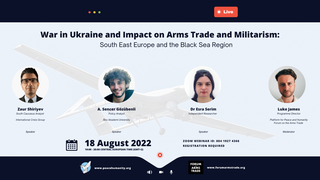
DATE: Thursday, August 18, 2022
TIME: 1:00-2:00 PM EST ||| 7:00-8:00PM CET
LOCATION: Virtual
See event recap
This event, in a series exploring the impacts of war in Ukraine on arms trade and militarism more globally, examines the actions and dilemmas faced by countries in South East Europe and the Black Sea Region.
In the Balkans, militaries are looking to modernize; Serbia’s path, with recent purchases from China and its historical and cultural ties to Russia makes for a complex dynamic. Turkey has sought both US and Russian weapons as it pursues its international security agenda. Its transfer of Bayrakter TB2 drones has been lethal in contemporary conflicts, including in Ukraine. In the South Caucasus, “neutral” Georgian government support for the sanctions regime against Russia has been well documented, as many Georgian youth continue to protest for closer ties to NATO and the EU. Neighboring Azerbaijan and Armenia have both massively increased military spending after their 2020 conflict.
This event, co-hosted by Platform for Peace and Humanity and the Forum on the Arms Trade’s Emerging Expert Program, intentionally brings perspectives from a number of younger professionals into the conversation about the humanitarian, economic and other implications of arms transfers, security assistance, and weapons use.
Panelists
* member of the Emerging Expert program
Resources and recommendations from panelists in follow-up to this event can be found here.
TIME: 1:00-2:00 PM EST ||| 7:00-8:00PM CET
LOCATION: Virtual
See event recap
This event, in a series exploring the impacts of war in Ukraine on arms trade and militarism more globally, examines the actions and dilemmas faced by countries in South East Europe and the Black Sea Region.
In the Balkans, militaries are looking to modernize; Serbia’s path, with recent purchases from China and its historical and cultural ties to Russia makes for a complex dynamic. Turkey has sought both US and Russian weapons as it pursues its international security agenda. Its transfer of Bayrakter TB2 drones has been lethal in contemporary conflicts, including in Ukraine. In the South Caucasus, “neutral” Georgian government support for the sanctions regime against Russia has been well documented, as many Georgian youth continue to protest for closer ties to NATO and the EU. Neighboring Azerbaijan and Armenia have both massively increased military spending after their 2020 conflict.
This event, co-hosted by Platform for Peace and Humanity and the Forum on the Arms Trade’s Emerging Expert Program, intentionally brings perspectives from a number of younger professionals into the conversation about the humanitarian, economic and other implications of arms transfers, security assistance, and weapons use.
Panelists
- Zaur Shiriyev, Analyst, South Caucasus, International Crisis Group
- A. Sencer Gözübenli, Balkan Studies and Foreign Policy Analyst, Åbo Akademi University
- Esra Serim, Independent Researcher*
- Luke James, Director of the South East Europe and Black Sea Region Programme, Platform for Peace and Humanity (moderator)*
* member of the Emerging Expert program
Resources and recommendations from panelists in follow-up to this event can be found here.
Annual Conference 2022
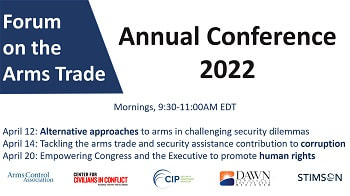
DATES: April 12, 14, and 20, 2022
TIME: 9:30-11:00 AM EDT
LOCATION: Virtual
This year’s annual conference tackled issues that have long been on the agenda for those promoting a more responsible arms trade, and explored in depth the sticking points and provided specific recommendations for progress on key topics.
It was co-sponsored by the Arms Control Association, Center for Civilians in Conflict (CIVIC), the Security Assistance Monitor at the Center for International Policy, Democracy for the Arab World Now (DAWN), and the Stimson Center.
Download REPORT detailing recommendations and other resources from the conference.
TIME: 9:30-11:00 AM EDT
LOCATION: Virtual
This year’s annual conference tackled issues that have long been on the agenda for those promoting a more responsible arms trade, and explored in depth the sticking points and provided specific recommendations for progress on key topics.
It was co-sponsored by the Arms Control Association, Center for Civilians in Conflict (CIVIC), the Security Assistance Monitor at the Center for International Policy, Democracy for the Arab World Now (DAWN), and the Stimson Center.
Download REPORT detailing recommendations and other resources from the conference.
April 12: Alternative approaches to arms in challenging security dilemmas
- Nancy Okail, President and CEO, Center for International Policy
- Anna Stavrianakis, Professor of International Relations, University of Sussex
- Sarah Leah Whitson, Executive Director, Democracy for the Arab World Now (DAWN)
- Stephen Miles, President, Win Without War (moderator)
April 14: Tackling the arms trade and security assistance contribution to corruption
- Mira Resnick, Deputy Assistant Secretary of State for Regional Security in the Bureau of Political-Military Affairs
- Michael Picard, consultant, Transparency International - Defence & Security
- Jodi Vittori, Professor of Practice and co-chair, Global Politics and Security program, Georgetown University School of Foreign Service
- William Hartung, Senior Research Fellow, Quincy Institute for Responsible Statecraft (moderator)
April 20: Empowering Congress and the Executive to promote human rights
- Senator Patty Murray (D-Wash.), introductory remarks (recorded)
- Annie Shiel, Senior Advisor for U.S. Policy and Advocacy, Center for Civilians in Conflict (CIVIC)
- Rachel Stohl, Vice President of Research Programs, Stimson Center
- Lauren Woods, Director, Security Assistance Monitor
- Kate Kizer, foreign policy columnist (moderator)
Legal Approaches to Reduce Gun Violence: Amicus Briefs and the Mexican Lawsuit

DATE: Thursday, March 10, 2022
TIME: 1:00-2:00 PM EST
LOCATION: Virtual
In August, Mexico filed a lawsuit against U.S. gun manufacturers and distributors in a Massachusetts federal district court, claiming that those companies “design, market, distribute, and sell guns in ways they know routinely arm the drug cartels in Mexico.” Identifying significant harm within Mexico, the suit calls for a range of measures in the United States to force the companies to curtail illegal arms flows. This effort has earned wide spread attention as a novel way to reduce gun violence, including via an international competition hosted by the Arms Control Association to which voters selected Mexico’s foreign minister as “arms control person of the year.”
On January 31, Mexico opposed a motion to dismiss the case, supported by amicus briefs from U.S. gun violence prevention groups, U.S. State Attorneys General, local U.S. district prosecutors, professors and scholars of international law, victims and scholars in Mexico, as well as two Latin America countries and a region-wide group.
Join us for a discussion of these briefs to explore arguments made and possibilities they open for this (and other) legal approaches to reduce gun violence.
This event is co-hosted by the Forum on the Arms Trade, Network to Prevent Gun Violence in the Americas, Center for American Progress, Giffords Law Center, Global Exchange, March for Our Lives, Newtown Action Alliance, and SEHLAC (Seguridad Humana para América Latina y el Caribe)
Participants
See also video, recap, and resources from related August event hosted by many of the same co-sponsors.
TIME: 1:00-2:00 PM EST
LOCATION: Virtual
In August, Mexico filed a lawsuit against U.S. gun manufacturers and distributors in a Massachusetts federal district court, claiming that those companies “design, market, distribute, and sell guns in ways they know routinely arm the drug cartels in Mexico.” Identifying significant harm within Mexico, the suit calls for a range of measures in the United States to force the companies to curtail illegal arms flows. This effort has earned wide spread attention as a novel way to reduce gun violence, including via an international competition hosted by the Arms Control Association to which voters selected Mexico’s foreign minister as “arms control person of the year.”
On January 31, Mexico opposed a motion to dismiss the case, supported by amicus briefs from U.S. gun violence prevention groups, U.S. State Attorneys General, local U.S. district prosecutors, professors and scholars of international law, victims and scholars in Mexico, as well as two Latin America countries and a region-wide group.
Join us for a discussion of these briefs to explore arguments made and possibilities they open for this (and other) legal approaches to reduce gun violence.
This event is co-hosted by the Forum on the Arms Trade, Network to Prevent Gun Violence in the Americas, Center for American Progress, Giffords Law Center, Global Exchange, March for Our Lives, Newtown Action Alliance, and SEHLAC (Seguridad Humana para América Latina y el Caribe)
Participants
- Chesa Boudin, San Francisco District Attorney - see amicus (welcome remarks)
- Maria Isabel Cruz Bernal, Human Rights activist, founder Sabuesos Guerreras A.C. (Warrior Hounds) - see amicus
- Maria Pia Devoto, Director, Asociación para Políticas Publicas (Association for Public Policies), and coordinator SEHLAC - see amicus
- Alla Lefkowitz, Senior Director, Affirmative Litigation, Everytown for Gun Safety - see amicus
- David Pucino, Deputy Chief Counsel, Giffords Law Center to Prevent Gun Violence (moderator)
See also video, recap, and resources from related August event hosted by many of the same co-sponsors.
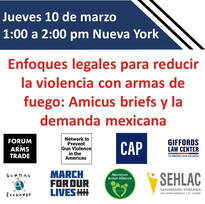
Enfoques legales para reducir la violencia con armas de fuego: Amicus briefs y la demanda mexicana
Jueves 10 de marzo de 2022, de 10:00 a. m. a 11:00 a. m. California / 1:00 a 2:00 p. m. Nueva York al conversatorio en línea
En agosto, México tomó una decisión sin precedentes y presentó una demanda en contra de 11 fabricantes y distribuidores de armas de Estados Unidos en un tribunal del distrito federal de Massachusetts, alegando que estas empresas “diseñan, comercializan, distribuyen y venden armas sabiendo que arman rutinariamente a los cárteles de la droga en México. ”
Al identificar el daño devastador que estas prácticas causan en México, la demanda exige una serie de medidas en los Estados Unidos para obligar a las empresas a reducir los flujos ilegales de armas. Este esfuerzo ha generado una amplia atención como forma novedosa de reducir la violencia armada, detonando acciones que incluyeron una competencia internacional organizada por la Asociación de Control de Armas en la que los votantes seleccionaron al Secretario de Relaciones Exteriores de México como "Personalidad del año en control de armas".
El 31 de enero, México se opuso a una moción para desestimar el caso por parte de las empresas demandadas, presentando sendos amicus curiae por parte de Global Exchange y muchos otros grupos de prevención de la violencia armada de EEUU, así como 13 fiscalías estatales y 12 distritales de Estados Unidos, académicos de México, dos países de América Latina y un grupo de trabajo regional.
Únase a nosotros para una discusión de estos informes para explorar los argumentos presentados y las posibilidades que abren para este (y otros) enfoques legales para reducir la violencia armada.
Panelistas confirmados:
Las presentaciones serán en inglés y español, con interpretación simultánea. También será retransmitido en directo por RompevientoTV y Península360 Press.
Este evento es co-producido por el Foro sobre el Comercio de Armas, la Red para Prevenir la Violencia Armada en las Américas, el Centro para el Progreso Estadounidense, el Centro Legal Giffords, Global Exchange y Marcha por Nuestras Vidas.
Jueves 10 de marzo de 2022, de 10:00 a. m. a 11:00 a. m. California / 1:00 a 2:00 p. m. Nueva York al conversatorio en línea
En agosto, México tomó una decisión sin precedentes y presentó una demanda en contra de 11 fabricantes y distribuidores de armas de Estados Unidos en un tribunal del distrito federal de Massachusetts, alegando que estas empresas “diseñan, comercializan, distribuyen y venden armas sabiendo que arman rutinariamente a los cárteles de la droga en México. ”
Al identificar el daño devastador que estas prácticas causan en México, la demanda exige una serie de medidas en los Estados Unidos para obligar a las empresas a reducir los flujos ilegales de armas. Este esfuerzo ha generado una amplia atención como forma novedosa de reducir la violencia armada, detonando acciones que incluyeron una competencia internacional organizada por la Asociación de Control de Armas en la que los votantes seleccionaron al Secretario de Relaciones Exteriores de México como "Personalidad del año en control de armas".
El 31 de enero, México se opuso a una moción para desestimar el caso por parte de las empresas demandadas, presentando sendos amicus curiae por parte de Global Exchange y muchos otros grupos de prevención de la violencia armada de EEUU, así como 13 fiscalías estatales y 12 distritales de Estados Unidos, académicos de México, dos países de América Latina y un grupo de trabajo regional.
Únase a nosotros para una discusión de estos informes para explorar los argumentos presentados y las posibilidades que abren para este (y otros) enfoques legales para reducir la violencia armada.
Panelistas confirmados:
- Chesa Boudin, el fiscal de Distrito de San Francisco - ver amicus
- Maria Isabel Cruz Bernal, activista de derechos humanos, fundadora Sabuesos Guerreras A.C. (Warrior Hounds) - ver amicus
- Maria Pia Devoto, Directora, Asociación para Políticas Publicas (Association for Public Policies), y coordinadora SEHLAC - ver amicus
- Alla Lefkowitz, Directora Senior de Litigios Afirmativos en Everytown for Gun Safety - ver amicus
- David Pucino, Consejero Principal Adjunto, Centro Legal Giffords para Prevenir la Violencia Armada (moderador)
Las presentaciones serán en inglés y español, con interpretación simultánea. También será retransmitido en directo por RompevientoTV y Península360 Press.
Este evento es co-producido por el Foro sobre el Comercio de Armas, la Red para Prevenir la Violencia Armada en las Américas, el Centro para el Progreso Estadounidense, el Centro Legal Giffords, Global Exchange y Marcha por Nuestras Vidas.
Evolving Financial Approaches to Disarmament and Weapons
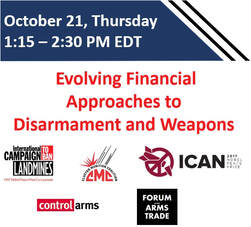
DATE: Thursday, October 21, 2021
TIME: 1:15-2:30 PM EDT
LOCATION: Virtual
Over the past decades, there has been a growing recognition by states parties to disarmament treaties that prohibitions on “assistance” extend to the financing or investment in companies manufacturing or developing banned weapons. So-called “product-based exclusions” are enshrined in national law, declared at meetings of states parties, and are growing more common in many national pension and sovereign wealth funds, as well as investment portfolios managed by financial institutions.
We also now see an increase in “behavior-based exclusions” or other actions, such as engagement, that are based on criteria related to how and where weapons sold by arms companies might be used. For example, a number of funds are including provisions related to the Arms Trade Treaty in their investment decisions. The Financial Action Task Force (FATF) seeks to deny weapons of mass destruction components and technology to non-state actors or sanctioned entities.
Join this side event to the UN General Assembly’s First Committee, open to a global audience, for a comparative perspective on how product-based and behavior-based approaches to weapons investment is working to further the Mine Ban Treaty, Convention on Cluster Munitions, Treaty on the Prohibition on Nuclear Weapons, Arms Trade Treaty, and other disarmament and weapons regulation efforts.
Hosted in partnership by the Forum on the Arms Trade, ICBL-CMC (International Campaign to Ban Landmines-Cluster Munition Coalition), ICAN (International Campaign to Abolish Nuclear Weapons), and Control Arms.
Panelists:
This event has now occurred. See video below. See also video guide for additional resources and to jump to specific topics during the conversation.
TIME: 1:15-2:30 PM EDT
LOCATION: Virtual
Over the past decades, there has been a growing recognition by states parties to disarmament treaties that prohibitions on “assistance” extend to the financing or investment in companies manufacturing or developing banned weapons. So-called “product-based exclusions” are enshrined in national law, declared at meetings of states parties, and are growing more common in many national pension and sovereign wealth funds, as well as investment portfolios managed by financial institutions.
We also now see an increase in “behavior-based exclusions” or other actions, such as engagement, that are based on criteria related to how and where weapons sold by arms companies might be used. For example, a number of funds are including provisions related to the Arms Trade Treaty in their investment decisions. The Financial Action Task Force (FATF) seeks to deny weapons of mass destruction components and technology to non-state actors or sanctioned entities.
Join this side event to the UN General Assembly’s First Committee, open to a global audience, for a comparative perspective on how product-based and behavior-based approaches to weapons investment is working to further the Mine Ban Treaty, Convention on Cluster Munitions, Treaty on the Prohibition on Nuclear Weapons, Arms Trade Treaty, and other disarmament and weapons regulation efforts.
Hosted in partnership by the Forum on the Arms Trade, ICBL-CMC (International Campaign to Ban Landmines-Cluster Munition Coalition), ICAN (International Campaign to Abolish Nuclear Weapons), and Control Arms.
Panelists:
- Mary Beth Gallagher, Director of Engagement, Domini Impact Investments LLC
- Cor Oudes, Project Lead, Conflict, Human Rights and the Financial Sector, PAX
- Susi Snyder, Financial Sector coordinator, ICAN
- Camilo Serna, Deputy Director and Co-Founder, Colombia Campaign Against Landmines (CCCM) (moderator)
This event has now occurred. See video below. See also video guide for additional resources and to jump to specific topics during the conversation.
The participants in this virtual discussion, Camilo Serna, Susi Snyder, Cor Oudes, and Mary Beth Gallagher are not registered investment advisers. Camilo Serna, Susi Snyder, and Cor Oudes, are not employed by or in any way affiliated with Domini Impact Investments (Domini).
The information presented is believed to be factual and up-to-date, but Domini does not guarantee its accuracy and it should not be regarded as a complete analysis of the subjects discussed.
All expressions of opinion reflect the judgment of the author/presenter as of the date of publication and are subject to change and do not constitute investment advice.
The information presented is believed to be factual and up-to-date, but Domini does not guarantee its accuracy and it should not be regarded as a complete analysis of the subjects discussed.
All expressions of opinion reflect the judgment of the author/presenter as of the date of publication and are subject to change and do not constitute investment advice.
Learning From The Afghanistan Experience: Re-Assessing U.S. Weapon and Security Assistance
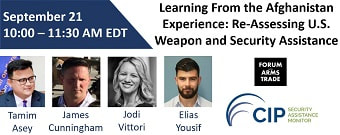
DATE: Tuesday, September 21, 2021
TIME: 10:00-11:30 AM EDT
LOCATION: Virtual
Please join the Forum on the Arms Trade and Security Assistance Monitor for a conversation examining failures in security assistance in Afghanistan and the potential consequences of weapons lost there, as well as lessons that should be applied to existing security assistance efforts in the Middle East and elsewhere, especially those riddled by corruption.
James Cunningham, project lead examining security sector assistance for the Special Inspector General for Afghanistan Reconstruction (SIGAR), will share insights on equipping the Afghan National Defense and Security Forces (ANDSF) and continuing efforts to understand the ANDSF’s rapid collapse, including the status of equipment provided. Tamim Asey, founder and executive chairman of the Institute of War & Peace Studies and former deputy minister in the Afghan Ministry of Defense will share his perspectives on the past and present situation in Afghanistan. Jodi Vittori, former Air Force lieutenant colonel and NATO counter-corruption task force member in Afghanistan, will expand on recommendations for ongoing U.S. security assistance published in a commentary by the Carnegie Endowment for International Peace, where she is a non-resident scholar in the Democracy, Conflict, and Governance Program. Elias Yousif, deputy director at the Security Assistance Monitor (SAM), will share findings from SAM’s database on weapons transferred to Afghanistan, an earlier report on lessons learned, and a new report on broader security assistance trends -- with an eye on potential ramifications in Afghanistan and beyond.
Panelists
This event has now occurred. See video below and the video guide for quickly finding specific topics during the conversation.
TIME: 10:00-11:30 AM EDT
LOCATION: Virtual
Please join the Forum on the Arms Trade and Security Assistance Monitor for a conversation examining failures in security assistance in Afghanistan and the potential consequences of weapons lost there, as well as lessons that should be applied to existing security assistance efforts in the Middle East and elsewhere, especially those riddled by corruption.
James Cunningham, project lead examining security sector assistance for the Special Inspector General for Afghanistan Reconstruction (SIGAR), will share insights on equipping the Afghan National Defense and Security Forces (ANDSF) and continuing efforts to understand the ANDSF’s rapid collapse, including the status of equipment provided. Tamim Asey, founder and executive chairman of the Institute of War & Peace Studies and former deputy minister in the Afghan Ministry of Defense will share his perspectives on the past and present situation in Afghanistan. Jodi Vittori, former Air Force lieutenant colonel and NATO counter-corruption task force member in Afghanistan, will expand on recommendations for ongoing U.S. security assistance published in a commentary by the Carnegie Endowment for International Peace, where she is a non-resident scholar in the Democracy, Conflict, and Governance Program. Elias Yousif, deputy director at the Security Assistance Monitor (SAM), will share findings from SAM’s database on weapons transferred to Afghanistan, an earlier report on lessons learned, and a new report on broader security assistance trends -- with an eye on potential ramifications in Afghanistan and beyond.
Panelists
- Tamim Asey, Founder and Executive Chairman, Institute of War & Peace Studies
- James Cunningham, Project Lead, Security Sector Assistance, Special Inspector General for Afghanistan Reconstruction (SIGAR)
- Jodi Vittori, Co-chair, Global Politics and Security Program, Georgetown University’s School of Foreign Service; Non-Resident Fellow, Carnegie Endowment for International Peace
- Elias Yousif, Deputy Director, Security Assistance Monitor, Center for International Policy
This event has now occurred. See video below and the video guide for quickly finding specific topics during the conversation.
Legal Approaches to Reduce Gun Violence: Mexican and U.S. Strategies
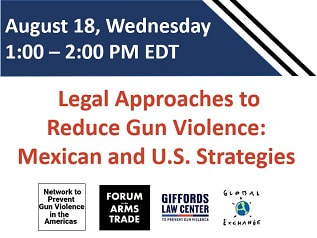
DATE: Wednesday, August 18, 2021
TIME: 1:00-2:00 PM EDT
LOCATION: Virtual
Attention to the production and marketing of firearms in the United States, in relation to violence within the country as well as outside U.S. borders, has been growing. This month, Mexico filed a high-profile lawsuit against U.S. weapons manufacturers, which follow upon a number of other legal suits filed in U.S. courts by state officials and citizen groups. In addition to the misuse and illicit transfer of firearms, the legal trade is also under scrutiny as the Biden administration recently notified Congress of a potential $5.5 million sale of fully automatic firearms to the Mexican Navy and Marines.
Join us for a discussion of these developments and what they might mean for combating gun violence in an event co-hosted by the Network to Prevent Gun Violence in the Americas, the Forum on the Arms Trade, the Giffords Law Center, and Global Exchange.
Panelists
This event has now occurred. See video below and our event recap for more information.
TIME: 1:00-2:00 PM EDT
LOCATION: Virtual
Attention to the production and marketing of firearms in the United States, in relation to violence within the country as well as outside U.S. borders, has been growing. This month, Mexico filed a high-profile lawsuit against U.S. weapons manufacturers, which follow upon a number of other legal suits filed in U.S. courts by state officials and citizen groups. In addition to the misuse and illicit transfer of firearms, the legal trade is also under scrutiny as the Biden administration recently notified Congress of a potential $5.5 million sale of fully automatic firearms to the Mexican Navy and Marines.
Join us for a discussion of these developments and what they might mean for combating gun violence in an event co-hosted by the Network to Prevent Gun Violence in the Americas, the Forum on the Arms Trade, the Giffords Law Center, and Global Exchange.
Panelists
- Ioan Grillo, journalist and author, including of Blood Gun Money: How America Arms Gangs and Cartels
- Kristen Rand, Legislative Director, Violence Policy Center - see slides (pdf)
- Steve Shadowen, Founding Partner, Hilliard & Shadowen LLP
- John Lindsay-Poland, Coordinator, Project to Stop US Arms to Mexico
This event has now occurred. See video below and our event recap for more information.
Exploration of Arms Reduction and Jobs I: Divestment and Transition
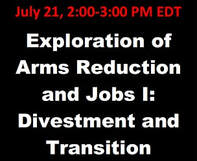
DATE: Wednesday, July 21, 2021
TIME: 2:00-3:00 PM EDT
LOCATION: Virtual
Please join the Forum on the Arms Trade for the first panel in a new series of events exploring arguments made for reducing defense spending and/or limiting the arms trade, and the concerns often raised about jobs and the economy. In this virtual gathering, the focus will be on weapons divestment initiatives as well as how communities can find or are finding employment alternatives to the defense industry -- relying on specific examples.
Lillian Mauldin, founding member of Women for Weapons Trade Transparency, will share insights on student-led efforts to convince the University of Texas system to disinvest from companies whose weapons have been used in the war in Yemen and elsewhere. Rich Stazinski, Executive Director of the Heartland Initiative, will discuss recent developments in the evolution of policies related to 'controversial weapons' within the faith-based and socially-responsible investment communities. Reporter Taylor Barnes will expand upon her investigations into the actions of community members, including labor leaders, who seek alternatives to defense production in Asheville, North Carolina and Huntsville, Alabama, and how the COVID-19 pandemic shook up the defense workforce and provided real-world examples of how workers nimbly repurposed their skills during the crisis.
Panelists
This event has now occurred. See video below and our event recap for more information.
TIME: 2:00-3:00 PM EDT
LOCATION: Virtual
Please join the Forum on the Arms Trade for the first panel in a new series of events exploring arguments made for reducing defense spending and/or limiting the arms trade, and the concerns often raised about jobs and the economy. In this virtual gathering, the focus will be on weapons divestment initiatives as well as how communities can find or are finding employment alternatives to the defense industry -- relying on specific examples.
Lillian Mauldin, founding member of Women for Weapons Trade Transparency, will share insights on student-led efforts to convince the University of Texas system to disinvest from companies whose weapons have been used in the war in Yemen and elsewhere. Rich Stazinski, Executive Director of the Heartland Initiative, will discuss recent developments in the evolution of policies related to 'controversial weapons' within the faith-based and socially-responsible investment communities. Reporter Taylor Barnes will expand upon her investigations into the actions of community members, including labor leaders, who seek alternatives to defense production in Asheville, North Carolina and Huntsville, Alabama, and how the COVID-19 pandemic shook up the defense workforce and provided real-world examples of how workers nimbly repurposed their skills during the crisis.
Panelists
- Taylor Barnes, Atlanta-based investigative journalist
- Lillian Mauldin, Founding Member, Women for Weapons Trade Transparency
- Rich Stazinski, Executive Director, Heartland Initiative
This event has now occurred. See video below and our event recap for more information.
Improving Oversight and Transparency in U.S. Small Arms Trade
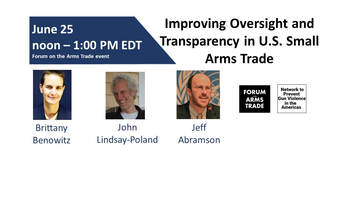
DATE: Friday, June 25, 2021
TIME: noon-1:00 PM EDT
LOCATION: Virtual
As the United States grapples with ongoing gun violence within its boundaries, it also must better address its role as the world's largest small arms exporter. Overall, public transparency into the sale and transfer of small arms from the United States is fragmented and Congressional awareness has decreased. Too often, these weapons are ending up in countries where there are acute human rights concerns, and some foreign companies are establishing production in the U.S. due to our relatively lax export laws.
Given the role that these weapons play in violence and conflict around the world, it is critical that oversight and transparency into their trade be improved.
As a candidate, Joe Biden promised to reverse the Trump-era policy that removed Congressional notifications and transferred export oversight for assault rifles and other weapons and ammunition to a list led by the Commerce Department -- removing them from the US Munitions List (USML). Many Congressional and civil society leaders have also spoken out for such a reversal. And there are many other steps that can be taken, including as relates to weapons flowing south that contribute to migration-spurring violence in Mexico and Central America.
The Forum on the Arms Trade and the Network to Prevent Gun Violence in the Americas as they hosted panelists in a discussion that included how to better apply existing law as well as measures the Executive Branch and Congress could adopt to address U.S. small arms export concerns.
Panelists
TIME: noon-1:00 PM EDT
LOCATION: Virtual
As the United States grapples with ongoing gun violence within its boundaries, it also must better address its role as the world's largest small arms exporter. Overall, public transparency into the sale and transfer of small arms from the United States is fragmented and Congressional awareness has decreased. Too often, these weapons are ending up in countries where there are acute human rights concerns, and some foreign companies are establishing production in the U.S. due to our relatively lax export laws.
Given the role that these weapons play in violence and conflict around the world, it is critical that oversight and transparency into their trade be improved.
As a candidate, Joe Biden promised to reverse the Trump-era policy that removed Congressional notifications and transferred export oversight for assault rifles and other weapons and ammunition to a list led by the Commerce Department -- removing them from the US Munitions List (USML). Many Congressional and civil society leaders have also spoken out for such a reversal. And there are many other steps that can be taken, including as relates to weapons flowing south that contribute to migration-spurring violence in Mexico and Central America.
The Forum on the Arms Trade and the Network to Prevent Gun Violence in the Americas as they hosted panelists in a discussion that included how to better apply existing law as well as measures the Executive Branch and Congress could adopt to address U.S. small arms export concerns.
Panelists
- Brittany Benowitz, Chief Counsel, American Bar Association (ABA) Center for Human Rights
- John Lindsay-Poland, Coordinator, Project to Stop US Arms to Mexico
- Jeff Abramson, Senior Fellow, Arms Control Association and Director, Forum on the Arms Trade
Biden and Congress at 100 Days - Assessing Arms Trade Policy
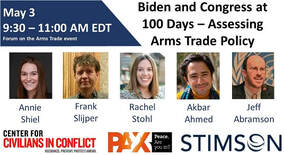
DATE: May 3, 2021
TIME: 9:30-11:00 AM EDT
LOCATION: Virtual
Two weeks into his administration on February 4, 2021, President Biden announced that the United States would no longer support offensive military operations in the war in Yemen, including relevant arms sales. The announcement marked a shift in U.S. policy toward Yemen and brought to the fore current U.S. arms transfer policies and the role that U.S. arms sales can have in sustaining conflict and facilitating harm. In recent years, Congress has also increasingly discussed the role of arms sales in U.S. foreign policy, proposing and passing numerous resolutions of disapproval on controversial arms transfers. In light of this renewed attention on U.S. arms sales and to mark the Biden administration’s and the 117th Congress’ first 100 days, please join the Forum on the Arms Trade and the Stimson Center, PAX, and the Center for Civilians in Conflict (CIVIC) for an expert conversation on the U.S. government’s approach to – as well as roles and responsibilities in – the global arms trade.
Panelists
TIME: 9:30-11:00 AM EDT
LOCATION: Virtual
Two weeks into his administration on February 4, 2021, President Biden announced that the United States would no longer support offensive military operations in the war in Yemen, including relevant arms sales. The announcement marked a shift in U.S. policy toward Yemen and brought to the fore current U.S. arms transfer policies and the role that U.S. arms sales can have in sustaining conflict and facilitating harm. In recent years, Congress has also increasingly discussed the role of arms sales in U.S. foreign policy, proposing and passing numerous resolutions of disapproval on controversial arms transfers. In light of this renewed attention on U.S. arms sales and to mark the Biden administration’s and the 117th Congress’ first 100 days, please join the Forum on the Arms Trade and the Stimson Center, PAX, and the Center for Civilians in Conflict (CIVIC) for an expert conversation on the U.S. government’s approach to – as well as roles and responsibilities in – the global arms trade.
Panelists
- Annie Shiel, Senior Advisor for U.S. Policy and Advocacy, Center for Civilians in Conflict (CIVIC)
- Frank Slijper, Project Leader, Arms Trade, PAX
- Rachel Stohl, Vice President, Stimson Center
- Akbar Shahid Ahmed, Senior Foreign Affairs Reporter, HuffPost
- Jeff Abramson, Senior Fellow, Arms Control Association (moderator)
Arms Sales to Conflict Zones
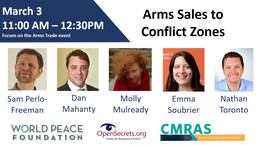
DATE: March 3, 2021
TIME: 11:00AM-12:30PM EST / 4:00-5:30 PM GMT
LOCATION: Virtual
Join in a discussion for the launch of "Business as Usual: How major weapons exporters arm the world’s conflicts" -- the initial report at the midpoint of a two-year project examining defense industries, foreign policy and armed conflict. (UPDATE: Report available here.)
Over the past decades, international efforts have increasingly sought to control arms exports to countries where conflicts are taking place, especially where such conflicts involve human rights abuses and violations of international humanitarian law (IHL). This first report looks at the top 11 arms exporters, examining whether export control measures – including international treaties, national legislation and policy, and the EU Common Position – correspond to actual, empirical, changes in practice on the part of arms suppliers.
TIME: 11:00AM-12:30PM EST / 4:00-5:30 PM GMT
LOCATION: Virtual
Join in a discussion for the launch of "Business as Usual: How major weapons exporters arm the world’s conflicts" -- the initial report at the midpoint of a two-year project examining defense industries, foreign policy and armed conflict. (UPDATE: Report available here.)
Over the past decades, international efforts have increasingly sought to control arms exports to countries where conflicts are taking place, especially where such conflicts involve human rights abuses and violations of international humanitarian law (IHL). This first report looks at the top 11 arms exporters, examining whether export control measures – including international treaties, national legislation and policy, and the EU Common Position – correspond to actual, empirical, changes in practice on the part of arms suppliers.
Panelists
This event is hosted by the Forum on the Arms Trade and sponsored by the World Peace Foundation, the Program on Civil-Military Relations in Arab States at the Malcolm H. Kerr Carnegie Middle East Center, and the Center for Responsive Politics.
This report is part of a research program, support for which was provided in part by a grant from the Carnegie Corporation of New York.
- Sam Perlo-Freeman, Research Coordinator, Campaign Against Arms Trade and Fellow, World Peace Foundation
- Dan Mahanty, Director, US Program, Center for Civilians in Conflict (CIVIC)
- Molly Mulready, Lawyer, formerly of the UK Foreign and Commonwealth Office
- Emma Soubrier, Visiting Scholar, Arab Gulf States Institute in Washington
- Nathan Toronto, Commissioning Editor, Malcolm H. Kerr Carnegie Middle East Center (moderator)
This event is hosted by the Forum on the Arms Trade and sponsored by the World Peace Foundation, the Program on Civil-Military Relations in Arab States at the Malcolm H. Kerr Carnegie Middle East Center, and the Center for Responsive Politics.
This report is part of a research program, support for which was provided in part by a grant from the Carnegie Corporation of New York.
Biden’s Arms Sales Review: What’s Needed Next
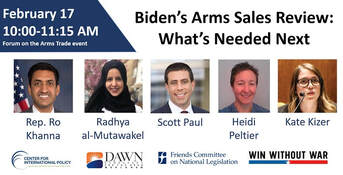
DATE: February 17, 2021
TIME: 10:00-11:15AM EST
LOCATION: Virtual
On February 4, President Biden announced that he was ending “all American support for offensive operations in the war in Yemen, including relevant arms sales." This followed a week after Secretary of State Blinken said that the United States was reviewing “pending [arms] sales, to make sure that what is being considered is something that advances our strategic objectives and advances our foreign policy.” How should the Biden administration define which arms sales are “relevant” and what are U.S. objectives?
Join Congressional and civil society leaders in examining how stopping arms transfers to Saudi Arabia and the United Arab Emirates could promote security in Yemen, and what else is needed to end the humanitarian crisis there. The panel will also tackle questions typically raised about other countries providing weapons to the region in the event of a reduction in U.S. transfers and the impact of arms sales on U.S. jobs and the economy.
TIME: 10:00-11:15AM EST
LOCATION: Virtual
On February 4, President Biden announced that he was ending “all American support for offensive operations in the war in Yemen, including relevant arms sales." This followed a week after Secretary of State Blinken said that the United States was reviewing “pending [arms] sales, to make sure that what is being considered is something that advances our strategic objectives and advances our foreign policy.” How should the Biden administration define which arms sales are “relevant” and what are U.S. objectives?
Join Congressional and civil society leaders in examining how stopping arms transfers to Saudi Arabia and the United Arab Emirates could promote security in Yemen, and what else is needed to end the humanitarian crisis there. The panel will also tackle questions typically raised about other countries providing weapons to the region in the event of a reduction in U.S. transfers and the impact of arms sales on U.S. jobs and the economy.
(See this for a timing guide to the video and other resources shared during the event.)
Remarks
Panelists
This event was hosted by the Forum on the Arms Trade and co-sponsored by the Center for International Policy, Democracy for the Arab World Now (DAWN), the Friends Committee on National Legislation (FCNL), and Win Without War.
Remarks
- Representative Ro Khanna (D-California) - see video
Panelists
- Radhya al-Mutawakel, Chairperson and Co-founder, Mwatana for Human Rights
- Scott Paul, Humanitarian Policy Lead, Oxfam America
- Heidi Peltier, Director, "20 Years of of War Project," Brown and Boston Universities
- Kate Kizer, Policy Director, Win Without War (moderator)
This event was hosted by the Forum on the Arms Trade and co-sponsored by the Center for International Policy, Democracy for the Arab World Now (DAWN), the Friends Committee on National Legislation (FCNL), and Win Without War.
ANNUAL CONFERENCE 2021 - Advancing More Responsible Arms Trade Policy - January 12, 2021
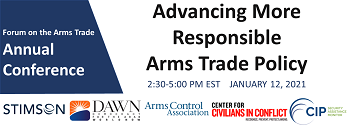
DATE: Tuesday, January 12, 2021
TIME: 2:30 - 5:00 PM EST
LOCATION: Virtual
Over the past four years, the Trump administration's insistence on sending weapons to rights-abusing governments in the Middle East, Africa, and Asia while sidestepping Congressional concerns and oversight has shown a bright spotlight on the global arms trade. In response, members of Congress have sought to assert their authority over U.S. arms exports, passing historic resolutions of disapproval, introducing legislative measures to reform the Arms Export Control Act, and engaging more publicly on the issue than at any time in recent memory.
With a new administration taking office, the 2021 Forum on the Arms Trade annual conference, “Advancing More Responsible Arms Trade Policy,” looks to inform early discussions of how lawmakers and a Biden White House can reshape the U.S. role in the global arms trade. This virtual event on Tuesday, January 12, will feature leading Congressional and civil society voices in virtual conversation with audience participants. RSVP now to join our in-depth discussion of new opportunities to develop a responsible U.S. arms transfer policy.
This event was co-sponsored by the Arms Control Association, Center for Civilians in Conflict (CIVIC), Democracy for the Arab World Now (DAWN), Security Assistance Monitor at the Center for International Policy, and the Stimson Center.
TIME: 2:30 - 5:00 PM EST
LOCATION: Virtual
Over the past four years, the Trump administration's insistence on sending weapons to rights-abusing governments in the Middle East, Africa, and Asia while sidestepping Congressional concerns and oversight has shown a bright spotlight on the global arms trade. In response, members of Congress have sought to assert their authority over U.S. arms exports, passing historic resolutions of disapproval, introducing legislative measures to reform the Arms Export Control Act, and engaging more publicly on the issue than at any time in recent memory.
With a new administration taking office, the 2021 Forum on the Arms Trade annual conference, “Advancing More Responsible Arms Trade Policy,” looks to inform early discussions of how lawmakers and a Biden White House can reshape the U.S. role in the global arms trade. This virtual event on Tuesday, January 12, will feature leading Congressional and civil society voices in virtual conversation with audience participants. RSVP now to join our in-depth discussion of new opportunities to develop a responsible U.S. arms transfer policy.
This event was co-sponsored by the Arms Control Association, Center for Civilians in Conflict (CIVIC), Democracy for the Arab World Now (DAWN), Security Assistance Monitor at the Center for International Policy, and the Stimson Center.
2:30-3:20 Advice for the Next Administration
3:20-4:00 Reporting on the Impact of the Arms Trade: Lessons for Policymakers
4:00-5:00 What Congress Can Do To Make Human Rights A Priority in Arms Trade Decisions
- Brittany Benowitz, Chief Counsel, American Bar Association (ABA) Center for Human Rights
- Sarah Holewinksi, Washington Director, Human Rights Watch
- Rose Jackson, Director, Policy Initiative, Digital Forensic Research Lab, Atlantic Council
- Moderated by Rachel Stohl, Vice President, Stimson Center
3:20-4:00 Reporting on the Impact of the Arms Trade: Lessons for Policymakers
- Radhya al-Mutawakel, Chairperson and Co-founder, Mwatana for Human Rights
- Íñigo Arredondo Vera, Head of the investigation team, El Universal
- Moderated by Sarah Leah Whitson, Executive Director, Democracy for the Arab World Now (DAWN)
4:00-5:00 What Congress Can Do To Make Human Rights A Priority in Arms Trade Decisions
- Representative Ilhan Omar (D-Minn.)
- Representative Ted Lieu (D-Calif.)
- Moderated by Dan Mahanty, Director, US Program, Center for Civilians in Conflict (CIVIC)
Moving Forward Via Humanitarian Disarmament
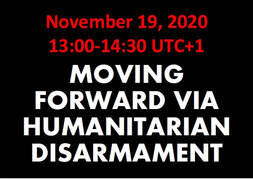
VIRTUAL EVENT -
DATE: November 19, 2020
TIME: 13:00-14:30 (UTC+1) / 7:00-8:30AM EST
The global pandemic has laid bare the need to define security based on human needs, rather than military might. In recognition, countries have continued to join key humanitarian disarmament efforts on landmines, cluster munitions, nuclear weapons, killer robots, explosive weapons in populated areas, the arms trade and more. But, in too many places, we see a shrinking of civil society space. And the pace of diplomatic progress has slowed.
An open letter that now has the support of more than 250 organizations worldwide calls on states to follow the lead of humanitarian disarmament in their responses to the pandemic, and “prioritize human security, reallocate military spending to humanitarian causes, work to eliminate inequalities, ensure multilateral fora incorporate diverse voices, and bring a cooperative mindset to problems of practice and policy.”
Join us in this virtual side event to discuss the humanitarian disarmament approach, latest developments, and the work ahead. Co-sponsored by the Permanent Mission of Costa Rica to the United Nations and other International Organizations in Geneva and the International Campaign to Ban Landmines, and organized by the Forum on the Arms Trade.
Panelists
DATE: November 19, 2020
TIME: 13:00-14:30 (UTC+1) / 7:00-8:30AM EST
The global pandemic has laid bare the need to define security based on human needs, rather than military might. In recognition, countries have continued to join key humanitarian disarmament efforts on landmines, cluster munitions, nuclear weapons, killer robots, explosive weapons in populated areas, the arms trade and more. But, in too many places, we see a shrinking of civil society space. And the pace of diplomatic progress has slowed.
An open letter that now has the support of more than 250 organizations worldwide calls on states to follow the lead of humanitarian disarmament in their responses to the pandemic, and “prioritize human security, reallocate military spending to humanitarian causes, work to eliminate inequalities, ensure multilateral fora incorporate diverse voices, and bring a cooperative mindset to problems of practice and policy.”
Join us in this virtual side event to discuss the humanitarian disarmament approach, latest developments, and the work ahead. Co-sponsored by the Permanent Mission of Costa Rica to the United Nations and other International Organizations in Geneva and the International Campaign to Ban Landmines, and organized by the Forum on the Arms Trade.
Panelists
- Ambassador Maritza Chan, Deputy Permanent Representative of Costa Rica to the United Nations in New York
- Maria Pia Devoto, Director, Asociación para Políticas Públicas (Association for Public Policy-APP -- Argentina), SEHLAC Coordinator
- Nillasi Liyanage, Youth Coordinator, Sri Lanka Campaign to Ban Landmines
- Jeff Abramson, Director, Forum on the Arms Trade and Senior Fellow, Arms Control Association - moderator
Moving Beyond Pandemic Arms Sales
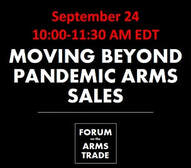
VIRTUAL EVENT
DATE: September 24, 2020
TIME: 10:00-11:30 AM EDT
The United States routinely sells weapons to repressive regimes, at times against Congressional wishes and without sufficient transparency. These transfers have continued unabated during the COVID-19 crisis. While a recent report by the State Department's Office of the Inspector General indicated that 2019 emergency arms sales declarations for weapons going to Saudi Arabia and the United Arab Emirates (UAE) may not have been illegal, they did not adequately take into account likely harm to civilians and laid bare the limits of Congressional oversight. New normalized relations between Israel and regional Arab states -- the UAE and Bahrain -- could also result in increased weapons transfers to regimes that suppress their citizens and further risk regional violence.
The upcoming presidential and Congressional elections present an opportunity to consider how U.S. arms sales policy can be improved to better protect civilians, be more transparent and accountable. New reports with recommendations for Congress (from CIVIC and the Stimson Center) and examining arm sales to the Middle East (from the Center for International Policy) will be launched just before or soon after the event. Reports by Transparency International on corruption in the global arms trade and the impact of arms sales to the Middle East will also be discussed. Join authors of those studies in this timely conversation.
Panelists
For annotated notes from the meeting with resources shared, key comments, and timing guide to the video, click here. Click video below to watch.
DATE: September 24, 2020
TIME: 10:00-11:30 AM EDT
The United States routinely sells weapons to repressive regimes, at times against Congressional wishes and without sufficient transparency. These transfers have continued unabated during the COVID-19 crisis. While a recent report by the State Department's Office of the Inspector General indicated that 2019 emergency arms sales declarations for weapons going to Saudi Arabia and the United Arab Emirates (UAE) may not have been illegal, they did not adequately take into account likely harm to civilians and laid bare the limits of Congressional oversight. New normalized relations between Israel and regional Arab states -- the UAE and Bahrain -- could also result in increased weapons transfers to regimes that suppress their citizens and further risk regional violence.
The upcoming presidential and Congressional elections present an opportunity to consider how U.S. arms sales policy can be improved to better protect civilians, be more transparent and accountable. New reports with recommendations for Congress (from CIVIC and the Stimson Center) and examining arm sales to the Middle East (from the Center for International Policy) will be launched just before or soon after the event. Reports by Transparency International on corruption in the global arms trade and the impact of arms sales to the Middle East will also be discussed. Join authors of those studies in this timely conversation.
Panelists
- William Hartung, Director, Arms and Security Program, Center for International Policy
- Daniel Mahanty, Director, US Program, Center for Civilians in Conflict (CIVIC)
- Jodi Vittori, U.S. Research and Policy Manager, Transparency International’s Defense and Security Program
- Jeff Abramson, Senior Fellow, Arms Control Association (moderator)
For annotated notes from the meeting with resources shared, key comments, and timing guide to the video, click here. Click video below to watch.
Gun Violence in the Americas: Local Solutions to a Hemispheric Challenge
hosted by the Consortium of Universities for Global Health (CUGH)
DATE: July 16, 2020
TIME: 1:00-2:00 PM EDT
For over a decade now, the Americas have had the highest rates of gun violence in the world. This burden is largely concentrated in the region’s cities. In 2019, 47 of the world’s 50 most violent cities were in the Americas (http://seguridadjusticiaypaz.org.mx/sala-de-prensa/1590-boletin-ranking-2019-de-las-50-ciudades-mas-violentas-del-mundo). The relatively free flow and easy access to firearms in the hemisphere – both legal and illegal – is a clear common denominator. Ultimately, regulating and reducing the arms trade holds promise to save countless lives. Yet, with someone in the hemisphere dying violently every three minutes, the work of saving lives cannot only wait for laws and policies to change; it involves action at multiple levels.
In this webinar, experts will discuss how cities and affected communities are leading the way as innovators and practitioners in preventing gun violence.
Speakers:
Presentations will be in English with simultaneous translation in Spanish.
DATE: July 16, 2020
TIME: 1:00-2:00 PM EDT
For over a decade now, the Americas have had the highest rates of gun violence in the world. This burden is largely concentrated in the region’s cities. In 2019, 47 of the world’s 50 most violent cities were in the Americas (http://seguridadjusticiaypaz.org.mx/sala-de-prensa/1590-boletin-ranking-2019-de-las-50-ciudades-mas-violentas-del-mundo). The relatively free flow and easy access to firearms in the hemisphere – both legal and illegal – is a clear common denominator. Ultimately, regulating and reducing the arms trade holds promise to save countless lives. Yet, with someone in the hemisphere dying violently every three minutes, the work of saving lives cannot only wait for laws and policies to change; it involves action at multiple levels.
In this webinar, experts will discuss how cities and affected communities are leading the way as innovators and practitioners in preventing gun violence.
Speakers:
- Dr. Rodrigo Guerrero, former Mayor of Cali, Colombia
- Roseanna Ander, Executive Director of the University of Chicago Crime Lab
- Ciera Walker, Executive Director of Live Free Chicago
- Dr. Rodrigo Canales, Associate Professor of Organizational Behavior, Yale School of Management
- Vaughn Crandall, Co-Director, California Partnership for Safe Communities
- Jeremy Biddle (moderator), Executive Director of MetroPEACE
Presentations will be in English with simultaneous translation in Spanish.
The flow of U.S. guns and violence against women in Mexico and Central America
hosted by the Center for American Progress
DATE: June 25, 2020
TIME: 1:00-2:30 PM EDT
Whether through illegal channels or through legal exports, the flow of U.S. guns has an impact on security and stability in Mexico and Central American countries. Often under-examined is how these weapons affect violence against women. In this webinar, experts will discuss how women in these countries face unique risks and challenges related to gun violence while also identifying policies and actions to address them.
Speakers:
Presentations will be in English with simultaneous translation in Spanish. This event is part of a series on Gun Violence in Mexico and Central America.
El flujo de armas de EE. UU. y la violencia contra las mujeres en México y Centroamérica
Evento virtual organizado por Center for American Progress
Ya sea de manera ilegal o mediante exportaciones legales, el flujo de armas de EE. UU. ha impactado la seguridad y estabilidad de México y los países centroamericanos. Sin embargo, poco se discute el impacto que estas armas tienen en la violencia contra las mujeres. En este webinar, expertas discutirán cómo las mujeres en estos países enfrentan riesgos y retos asociados con armas de fuego y presentarán algunas propuestas de acción para resolverlas.
Panelistas:
Las presentaciones serán en ingles con traducción simultanea a español. El evento forma parte de una serie de webinars sobre la violencia armada en México y Centro América
DATE: June 25, 2020
TIME: 1:00-2:30 PM EDT
Whether through illegal channels or through legal exports, the flow of U.S. guns has an impact on security and stability in Mexico and Central American countries. Often under-examined is how these weapons affect violence against women. In this webinar, experts will discuss how women in these countries face unique risks and challenges related to gun violence while also identifying policies and actions to address them.
Speakers:
- Rukmani Bhatia (Moderator), Center for American Progress
- Giada Greco, United Nations Office on Drugs and Crime
- Estefanía Vela Barba, Intersecta, Organización para la Igualdad A.C.
- Ana Yancy Espinoza, Fundación Arias para la Paz y el Progreso Humano
- Cecilia Farfán-Méndez, Center for U.S.-Mexican Studies
Presentations will be in English with simultaneous translation in Spanish. This event is part of a series on Gun Violence in Mexico and Central America.
El flujo de armas de EE. UU. y la violencia contra las mujeres en México y Centroamérica
Evento virtual organizado por Center for American Progress
Ya sea de manera ilegal o mediante exportaciones legales, el flujo de armas de EE. UU. ha impactado la seguridad y estabilidad de México y los países centroamericanos. Sin embargo, poco se discute el impacto que estas armas tienen en la violencia contra las mujeres. En este webinar, expertas discutirán cómo las mujeres en estos países enfrentan riesgos y retos asociados con armas de fuego y presentarán algunas propuestas de acción para resolverlas.
Panelistas:
- Rukmani Bhatia (moderadora), Center for American Progress
- Giada Greco, United Nations Office on Drugs and Crime
- Estefanía Vela Barba, Intersecta, Organización para la Igualdad A.C.
- Ana Yancy Espinoza, Fundación Arias para la Paz y el Progreso Humano
- Cecilia Farfán-Méndez, Center for U.S.-Mexican Studies
Las presentaciones serán en ingles con traducción simultanea a español. El evento forma parte de una serie de webinars sobre la violencia armada en México y Centro América
Regional strategies to stop the flow and use of firearms in Mesoamerica
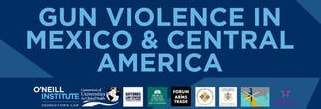 This event is one in a series co-organized by the Forum on the Arms Trade. Click image above for more details.
This event is one in a series co-organized by the Forum on the Arms Trade. Click image above for more details.
VIRTUAL EVENT - hosted by Global Exchange
DATE: May 28, 2020
TIME: 1:00-2:00 PM EDT
Mexico and the Northern Triangle of Central America suffer from extremely high levels of gun homicides and other gun violence. What are the mechanisms and impacts of this gun violence, and what policies and actions can people in the region take to confront it? In this webinar, expert journalists and researchers discuss the gun market and its human impacts, and propose policies and strategies to stem gun violence in Mexico, Honduras, El Salvador and Guatemala.
Speakers:
Presentations will be in Spanish, with simultaneous interpretation into English. It will also be transmitted on Facebook Live.
Sponsored by: Global Exchange; 24-0; Forum on the Arms Trade; Stop US Arms to Mexico; Universidad Anahuac; Medical College of Wisconsin; Center for American Progress; John Jay College of Criminal Justice, City University of New York
---
Armas de fuego en México y Centroamérica: Enfoques nacionales para frenar el flujo y uso de armas
México y el Triángulo Norte de Centroamérica sufren de altísimos niveles de homicidios y otra violencia cometida con armas de fuego. ¿Cuáles son los mecanismos e impactos de esta violencia con armas? ¿Y qué políticas y acciones se pueden tomar en la región para enfrentar este flagelo? En este webinar, periodistas e investigadoras exponen del mercado de armas, su impacto humano, y proponen políticas y estrategias para frenar la violencia de armas de fuego México, Honduras, El Salvador y Guatemala.
Panelistas:
Las presentaciones serán en español, con interpretación simultánea al inglés. Se transmite también en Facebook Live.
Organizado por: Global Exchange; 24-0; Forum on the Arms Trade; Stop US Arms to Mexico; Universidad Anahuac; Medical College of Wisconsin; Center for American Progress, Escuela de Justicia Penal John Jay, Universidad de la Ciudad de Nueva York.
DATE: May 28, 2020
TIME: 1:00-2:00 PM EDT
Mexico and the Northern Triangle of Central America suffer from extremely high levels of gun homicides and other gun violence. What are the mechanisms and impacts of this gun violence, and what policies and actions can people in the region take to confront it? In this webinar, expert journalists and researchers discuss the gun market and its human impacts, and propose policies and strategies to stem gun violence in Mexico, Honduras, El Salvador and Guatemala.
Speakers:
- Montserrat Martínez, Research Coordinator, 24-0 (Mexico)
- Dr. Arturo Cervantes, Universidad Anahuac (Mexico)
- Mark Ungar, Brooklyn College
- Suchit Chávez, Salvadoran journalist
- Natalia Báez Zamudio, Mexican Commission for the Defense and Promotion of Human Rights
- Moderator: Suhayla Bazbaz, Inovación Social (Mexico)
Presentations will be in Spanish, with simultaneous interpretation into English. It will also be transmitted on Facebook Live.
Sponsored by: Global Exchange; 24-0; Forum on the Arms Trade; Stop US Arms to Mexico; Universidad Anahuac; Medical College of Wisconsin; Center for American Progress; John Jay College of Criminal Justice, City University of New York
---
Armas de fuego en México y Centroamérica: Enfoques nacionales para frenar el flujo y uso de armas
México y el Triángulo Norte de Centroamérica sufren de altísimos niveles de homicidios y otra violencia cometida con armas de fuego. ¿Cuáles son los mecanismos e impactos de esta violencia con armas? ¿Y qué políticas y acciones se pueden tomar en la región para enfrentar este flagelo? En este webinar, periodistas e investigadoras exponen del mercado de armas, su impacto humano, y proponen políticas y estrategias para frenar la violencia de armas de fuego México, Honduras, El Salvador y Guatemala.
Panelistas:
- Montserrat Martínez, Coordinadora de Investigación, 24-0 (México)
- Dr. Arturo Cervantes, Universidad Anahuac (México)
- Mark Ungar, Brooklyn College
- Suchit Chávez, periodista salvadoreña
- Natalia Báez Zamudio, Comisión Mexicana para la Defensa y Promoción de Derechos Humanos
- Moderadora: Suhayla Bazbaz, Inovación Social (México)
Las presentaciones serán en español, con interpretación simultánea al inglés. Se transmite también en Facebook Live.
Organizado por: Global Exchange; 24-0; Forum on the Arms Trade; Stop US Arms to Mexico; Universidad Anahuac; Medical College of Wisconsin; Center for American Progress, Escuela de Justicia Penal John Jay, Universidad de la Ciudad de Nueva York.
U.S. Arms Sales in the Time of COVID-19
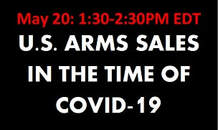
VIRTUAL EVENT - hosted by the Stimson Center
DATE: May 20, 2020
TIME: 1:30-2:30 PM EDT
The COVID-19 pandemic has challenged global responses and resources. Yet U.S. arms sales continue, including to governments with repressive regimes and considerable human rights concerns. In April 2020 alone, the Trump administration notified Congress of more than $2 billion in potential weapons exports, and another $3 billion in May so far. With COVID-19 prompting the United States and international arms purchasers to reassess their own military expenditures, the current environment may present an opportunity to rethink the United States’ approach to global arms sales. Join a discussion on the ways the administration and Congress can revise approaches to the U.S. arms trade of the future.
Panelists
This webinar was co-sponsored by the Forum on the Arms Trade. RSVP detailed forthcoming.
DATE: May 20, 2020
TIME: 1:30-2:30 PM EDT
The COVID-19 pandemic has challenged global responses and resources. Yet U.S. arms sales continue, including to governments with repressive regimes and considerable human rights concerns. In April 2020 alone, the Trump administration notified Congress of more than $2 billion in potential weapons exports, and another $3 billion in May so far. With COVID-19 prompting the United States and international arms purchasers to reassess their own military expenditures, the current environment may present an opportunity to rethink the United States’ approach to global arms sales. Join a discussion on the ways the administration and Congress can revise approaches to the U.S. arms trade of the future.
Panelists
- Brittany Benowitz, Chief Counsel, American Bar Association (ABA) Center for Human Rights
- William Hartung, Director, Arms and Security Program, Center for International Policy
- Diana Ohlbaum, Senior Strategist and Legislative Director for Foreign Policy, Friends Committee on National Legislation (FCNL)
- Rachel Stohl, Vice President. Stimson Center
This webinar was co-sponsored by the Forum on the Arms Trade. RSVP detailed forthcoming.
Arms Trafficking in the Americas
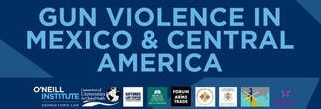 This event is one in a series co-organized by the Forum on the Arms Trade. Click image above for more details.
This event is one in a series co-organized by the Forum on the Arms Trade. Click image above for more details.
VIRTUAL EVENT - hosted by the Stimson Center
DATE: May 14, 2020
TIME: 1:00-2:00 PM EDT
Illicit trafficking in conventional weapons is a global phenomenon that has an outsized impact on security and stability in countries around the world. Often, these weapons are diverted from legal markets into illicit networks to malicious ends. Join the Stimson Center on May 14 at 1-2 pm EST for a discussion on the mechanics and challenges of illicit arms trafficking with a focus on Mexico and Central America. The event will be simultaneously interpreted into Spanish.
El tráfico ilícito de armas convencionales es un fenómeno global que tiene un gran impacto en la seguridad y estabilidad de los países. Con frecuencia, estas armas se desvían del mercado legal a redes ilícitas y son utilizadas con fines criminales. El Stimson Center te invita a unirte a una discusión sobre los mecanismo y retos del tráfico ilícito de armas con un enfoque en México y Centro-América. El evento será simultáneamente traducido al español.
Panel
DATE: May 14, 2020
TIME: 1:00-2:00 PM EDT
Illicit trafficking in conventional weapons is a global phenomenon that has an outsized impact on security and stability in countries around the world. Often, these weapons are diverted from legal markets into illicit networks to malicious ends. Join the Stimson Center on May 14 at 1-2 pm EST for a discussion on the mechanics and challenges of illicit arms trafficking with a focus on Mexico and Central America. The event will be simultaneously interpreted into Spanish.
El tráfico ilícito de armas convencionales es un fenómeno global que tiene un gran impacto en la seguridad y estabilidad de los países. Con frecuencia, estas armas se desvían del mercado legal a redes ilícitas y son utilizadas con fines criminales. El Stimson Center te invita a unirte a una discusión sobre los mecanismo y retos del tráfico ilícito de armas con un enfoque en México y Centro-América. El evento será simultáneamente traducido al español.
Panel
- William F. Kullman, Retired U.S. ATF/Independent Consultant
- Kristen Rand, Legislative Director, Violence Policy Center
- Matt Schroeder, Senior Researcher, Small Arms Survey
- Rachel Stohl, Vice President, Stimson Center
Gun Violence in Mexico and Central America: Facing the Challenges and the Path to Solutions
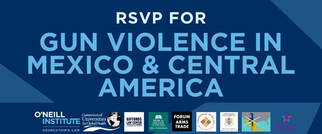
VIRTUAL EVENT
DATE: April 21, 2020
TIME: 1:00-2:30 PM EDT
English | Español
The global burden of gun violence accounts for more than 250,000 deaths worldwide, and half of these deaths occur in just six countries – all in the Americas.This public health and humanitarian crisis has significant challenges, requiring multiple policy and program approaches for making our respective nations healthy and safe. This first webinar, in a series currently being planned, is intended to convene public health, humanitarian, arms control, policy, legal, human rights and other leaders to focus on challenges ahead and finding solutions.
This event is held in partnership with the Medical College of Wisconsin's Office of Global Health, the Consortium of Universities for Global Health, Giffords Law Center, Forum on the Arms Trade, Universidad Anáhuac, Whitney R. Harris World Law Institute, Stop US Arms to Mexico, Brady, and the O'Neill Institute for National and Global Health Law at Georgetown University Law Center.
Simultaneous translation into Spanish provided.
Panel
(See related video of "Webinar | Gun Violence in the Americas" hosted by the Consortium on Universities on Global Health (CUGH) with John Lindsay-Poland+, March 24, 2020; and also more information about this series here.)
DATE: April 21, 2020
TIME: 1:00-2:30 PM EDT
English | Español
The global burden of gun violence accounts for more than 250,000 deaths worldwide, and half of these deaths occur in just six countries – all in the Americas.This public health and humanitarian crisis has significant challenges, requiring multiple policy and program approaches for making our respective nations healthy and safe. This first webinar, in a series currently being planned, is intended to convene public health, humanitarian, arms control, policy, legal, human rights and other leaders to focus on challenges ahead and finding solutions.
This event is held in partnership with the Medical College of Wisconsin's Office of Global Health, the Consortium of Universities for Global Health, Giffords Law Center, Forum on the Arms Trade, Universidad Anáhuac, Whitney R. Harris World Law Institute, Stop US Arms to Mexico, Brady, and the O'Neill Institute for National and Global Health Law at Georgetown University Law Center.
Simultaneous translation into Spanish provided.
Panel
- Arturo Cervantes, Carlos Peralta Chair of Public Health, Anáhuac University, Mexico
- Araceli Rodríguez, human rights defender in Mexico
- John Lindsay-Poland, Coordinator, Project to Stop US Arms to Mexico
- Eugenio Weigend, Associate Director for Gun Violence Prevention, Center for American Progress
- Laura Carlsen, Director, The Americas Program
- Rachel Stohl, Vice President, Stimson Center (moderator)
(See related video of "Webinar | Gun Violence in the Americas" hosted by the Consortium on Universities on Global Health (CUGH) with John Lindsay-Poland+, March 24, 2020; and also more information about this series here.)
U.S. Foreign Policy Moving Forward: Perspectives from the Middle East
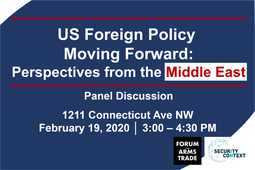
DATE: February 19, 2020
TIME: 3:00-4:30 PM
LOCATION: Stimson Center, 1211 Connecticut Ave NW, 8th Floor, Washington, DC 20036
Co-hosted by the Forum on the Arms Trade and Security in Context.
Over the past decade the Middle East has witnessed upheavals and violent conflicts that have resulted in a devastating human toll. Over the same time-period, there has been a growing debate about the nature of United States engagement in the region- what it is and what it should be. This panel will bring together experts on US foreign policy with scholars of the Middle East to discuss United States presence in the region from different perspectives.
The discussion will touch on a variety of topics, including the role of the United States in the major ongoing conflicts, the costs and consequences of United States arms sales to the region, and the question of whether or not the United States is in fact disengaging from the region or distancing itself from its traditional allies. Panelists will contribute to understanding the multiple consequences on Middle Eastern states and societies of external intervention (military, political, economic) in the region by the United States and other countries.
Panelists will also explore what concrete policy alternatives presidential candidates and United States policymakers should consider in terms of broader United States engagement with the region.
TIME: 3:00-4:30 PM
LOCATION: Stimson Center, 1211 Connecticut Ave NW, 8th Floor, Washington, DC 20036
Co-hosted by the Forum on the Arms Trade and Security in Context.
Over the past decade the Middle East has witnessed upheavals and violent conflicts that have resulted in a devastating human toll. Over the same time-period, there has been a growing debate about the nature of United States engagement in the region- what it is and what it should be. This panel will bring together experts on US foreign policy with scholars of the Middle East to discuss United States presence in the region from different perspectives.
The discussion will touch on a variety of topics, including the role of the United States in the major ongoing conflicts, the costs and consequences of United States arms sales to the region, and the question of whether or not the United States is in fact disengaging from the region or distancing itself from its traditional allies. Panelists will contribute to understanding the multiple consequences on Middle Eastern states and societies of external intervention (military, political, economic) in the region by the United States and other countries.
Panelists will also explore what concrete policy alternatives presidential candidates and United States policymakers should consider in terms of broader United States engagement with the region.
- Omar S. Dahi, Research Associate, Political Economy Research Institute, University of Massachusetts Amherst, and Project Director, Security in Context
- Jodi Vittori, U.S. Research and Policy Manager, Transparency International’s Defense and Security Program
- Samer Abboud, Associate Professor of Global Interdisciplinary Studies, Villanova University
- Linda Bishai, Professorial Lecturer, Elliott School of International Affairs, George Washington University (moderator)
Listen also to Security in Context podcast
And read Elias Yousif, "Militarization of the Middle East began long before the US invasion of Iraq," Responsible Statecraft, February 28, 2020.
And read Elias Yousif, "Militarization of the Middle East began long before the US invasion of Iraq," Responsible Statecraft, February 28, 2020.
What Do High Schoolers Have to Say About Arms Sales: Special Debate Event
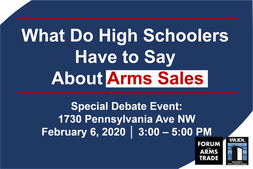
DATE: February 6, 2020
TIME: 3:00-5:00PM
LOCATION: Open Society Foundations, 1730 Pennsylvania Ave NW, Washington, DC 20006
At a time when the provision of arms and security assistance is at the heart of a presidential impeachment, high school students across the country are debating whether the United States should "substantially reduce" its arms sales. In a continuation of a partnership between the Washington Urban Debate League (WUDL) and the Forum on the Arms Trade, you are invited to join us for a special public debate on these issues. Two teams of two students from a local area WUDL urban school will present a modified one-hour debate. Afterwards, four policy professionals will offer a critique, before opening it up to the audience for questions and to the students to share how these issues are resonating with youth today.
Media welcome to attend. Video available afterwards for national audience. RSVP below.
School Without Walls debaters:
Commenters:
Contacts and more information:
Jeff Abramson, Senior Fellow, Arms Control Association and Director, Forum on the Arms Trade – (202) 780-6215, [email protected],
David Trigaux, Director, Washington Urban Debate League – (202) 770-7887, [email protected]
Forum on the Arms Trade: https://www.forumarmstrade.org/ and https://www.forumarmstrade.org/hspolicydebate.html
WUDL: http://www.urbandebatewashingtondc.org/
TIME: 3:00-5:00PM
LOCATION: Open Society Foundations, 1730 Pennsylvania Ave NW, Washington, DC 20006
At a time when the provision of arms and security assistance is at the heart of a presidential impeachment, high school students across the country are debating whether the United States should "substantially reduce" its arms sales. In a continuation of a partnership between the Washington Urban Debate League (WUDL) and the Forum on the Arms Trade, you are invited to join us for a special public debate on these issues. Two teams of two students from a local area WUDL urban school will present a modified one-hour debate. Afterwards, four policy professionals will offer a critique, before opening it up to the audience for questions and to the students to share how these issues are resonating with youth today.
Media welcome to attend. Video available afterwards for national audience. RSVP below.
School Without Walls debaters:
- Savannah Alexander
- Lucy Chamberlain
- Zara Escobar
- Juliette Krevat
Commenters:
- Jeff Abramson, Senior Fellow, Arms Control Association and Director, Forum on the Arms Trade
- Melissa Dalton, Senior Fellow and Deputy Director, International Security Program, Center for Strategic and International Studies (CSIS) and Director, Cooperative Defense Project, CSIS
- Josh Paul, Director, Office of Congressional & Public Affairs, Bureau of Political-Military Affairs (PM/CPA), State Department
- Alex Wagner, Vice President, Strategic Initiatives, Aerospace Industries Association (AIA) and the Senior Advisor to the President, AIA
Contacts and more information:
Jeff Abramson, Senior Fellow, Arms Control Association and Director, Forum on the Arms Trade – (202) 780-6215, [email protected],
David Trigaux, Director, Washington Urban Debate League – (202) 770-7887, [email protected]
Forum on the Arms Trade: https://www.forumarmstrade.org/ and https://www.forumarmstrade.org/hspolicydebate.html
WUDL: http://www.urbandebatewashingtondc.org/
Annual Conference - Beyond the Headlines: Redefining Responsibility in the Arms Trade
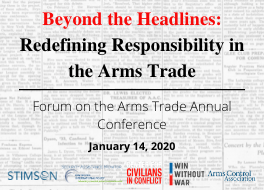
DATE: Tuesday, January 14, 2020
LOCATION: Stimson Center, 1211 Connecticut Ave NW, 8th Floor, Washington, DC 20036
In the wake of continued U.S. arms provision to Saudi Arabia after the murder of Jamal Khashoggi, in impeachment investigations of security assistance initially withheld for Ukraine, and in withdrawal of support to the Kurds in Syria, the arms trade has been at the center of the news in recent months. Missing at times, however, has been a deeper discussion of what is responsible arms trade moving forward.
The second Forum on the Arms Trade annual conference, “Beyond the Headlines: Redefining Responsibility in the Arms Trade,” is a half-day event taking place Tuesday, January 14 that will feature leading Congressional and civil society voices in conversation with audience participants. RSVP now to examine in depth why arms trade issues are in the spotlight and for insights into making that trade more responsible in 2020, and the decade ahead.
This event is co-sponsored by the Arms Control Association, Center for Civilians in Conflict (CIVIC), Security Assistance Monitor at the Center for International Policy, Win Without War, and the Stimson Center.
LOCATION: Stimson Center, 1211 Connecticut Ave NW, 8th Floor, Washington, DC 20036
In the wake of continued U.S. arms provision to Saudi Arabia after the murder of Jamal Khashoggi, in impeachment investigations of security assistance initially withheld for Ukraine, and in withdrawal of support to the Kurds in Syria, the arms trade has been at the center of the news in recent months. Missing at times, however, has been a deeper discussion of what is responsible arms trade moving forward.
The second Forum on the Arms Trade annual conference, “Beyond the Headlines: Redefining Responsibility in the Arms Trade,” is a half-day event taking place Tuesday, January 14 that will feature leading Congressional and civil society voices in conversation with audience participants. RSVP now to examine in depth why arms trade issues are in the spotlight and for insights into making that trade more responsible in 2020, and the decade ahead.
This event is co-sponsored by the Arms Control Association, Center for Civilians in Conflict (CIVIC), Security Assistance Monitor at the Center for International Policy, Win Without War, and the Stimson Center.
11:30-noon Lunch available
Noon-12:40 Keynote Address by Rep. Ted Lieu (California): The Need for Arms Trade Responsibility
12:45-2:00 Panel: Going Beyond the Headlines - Understanding The Longer Term Dynamics of Today’s News
2:15-3:30 Panel: Redefining Responsibility in the Arms Trade
3:30-4:45 Arms Trade in Popular Drama - Madam Secretary and "Strategic Ambiguity"
4:45-5:30 Closing Remarks and Reception
Noon-12:40 Keynote Address by Rep. Ted Lieu (California): The Need for Arms Trade Responsibility
12:45-2:00 Panel: Going Beyond the Headlines - Understanding The Longer Term Dynamics of Today’s News
- Adam Isacson, Director for Defense Oversight, Washington Office on Latin America (WOLA)
- Scott Paul, Humanitarian Policy Lead, Oxfam Ameriac
- Dina Smeltz, Senior Fellow, Public Opinion and Foreign Policy, Chicago Council on Global Affairs
- Rachel Stohl, Vice President, Stimson Center (moderator)
2:15-3:30 Panel: Redefining Responsibility in the Arms Trade
- Daniel Mahanty, Director, US Program, Center for Civilians in Conflict (CIVIC)
- Diana Ohlbaum, Senior Strategist and Legislative Director for Foreign Policy, Friends Committee on National Legislation (FCNL)
- Kate Kizer, Policy Director, Win Without War
- Jeff Abramson, Senior Fellow, Arms Control Association (moderator)
3:30-4:45 Arms Trade in Popular Drama - Madam Secretary and "Strategic Ambiguity"
- David Grae, Executive Producer, Madam Secretary (CBS)
- Brittany Benowitz, Chief Counsel, American Bar Association (ABA) Center for Human Rights
- Mandy Smithberger, Director, Straus Military Reform Project, Center for Defense Information, Project On Government Oversight
- Colby Goodman, Senior Consultant, Transparency International Defence and Security (moderator)
4:45-5:30 Closing Remarks and Reception
Progress Without U.S. Leadership? Humanitarian Disarmament
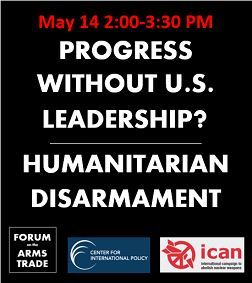
DATE: Tuesday, May 14, 2019
TIME: 2:00-3:30 PM (EDT)
LOCATION: James Martin Center for Nonproliferation Studies
1400 K Street, NW, Suite 1225
Washington, D.C. 20005
At a time when U.S. leadership on multilateral and international efforts is drawn into question, humanitarian disarmament approaches may provide a model for progress.
Humanitarian disarmament, which puts human security at its core, is led by a civil society partnership with states and international organizations. It can set and advance norms that save many lives and impact the behavior of non-state and state actors, including the United States -- often without or contrary to U.S. government leadership efforts. This event brings together campaign leaders to provide a way for examining humanitarian disarmament broadly. It also will look in-depth at recent successes and challenges related to landmines and cluster munitions, nuclear weapons, and killer robots (aka lethal autonomous weapons) – campaigns related to two of which earned Nobel Peace Prizes in 1997 and 2017.
This event is organized by the Forum on the Arms Trade and co-sponsored by the Center for International Policy and International Coalition to Abolish Nuclear Weapons. Please bring photo identification for entry to the event.
Panelists:
- Hector Guerra, Director, International Campaign to Ban Landmines-Cluster Munition Coalition (ICBL-CMC)
- Mary Wareham, Advocacy Director, Arms Division, Human Rights Watch and Global Coordinator, Campaign to Stop Killer Robots
- Seth Shelden, United Nations Liaison, International Coalition to Abolish Nuclear Weapons (ICAN)
- Mica Bevington, U.S. Director of Marketing and Communications, Humanity & Inclusion (moderator)
Press Briefing on Firearms Export Reform
|
Tuesday, March 5 at 3:30PM (US EST)
On Feb. 4, the Trump administration presented to Congress new rules for the international sale of military-style firearms that could make it easier to export the gun violence and weapons used in mass shootings. The changes, which could have been officially published the first week of March if not for a temporary hold, would remove Congress from its oversight role, and threaten to aid terrorists and criminals. |
The Forum on the Arms Trade invited media to join-in for a press tele-conference where Representatives Norma Torres (D-CA) and James McGovern (D-MA) to discuss their concerns about the proposed changes and their efforts via measures such as H.R. 1134. Civil society experts will add their analysis and also be available for questions.
Audio is available here.
Select quotes below:
Audio is available here.
Select quotes below:
|
|
|
|
|
|
SPEAKERS:
SELECT RESOURCES:
H.R. 1134 - Prevent Crime and Terrorism Act of 2019 (introduced Feb. 8)Press Releases
- Representative Norma J. Torres (D-CA)
- Representative James P. McGovern (D-MA)
- Kris Brown, President, Brady
- Jeff Abramson, Senior Fellow, Arms Control Association
- Kristen Rand, Legislative Director, Violence Policy Center
- John Lindsay-Poland, Coordinator, Project to Stop U.S. Arms to Mexico
SELECT RESOURCES:
H.R. 1134 - Prevent Crime and Terrorism Act of 2019 (introduced Feb. 8)Press Releases
- Torres, Engel Introduce Bill to Block Trump Administration Proposal to Deregulate Firearm Exports, Feb. 8
- Torres, Engel Statement on Trump Administration Firearms Export Rule Change, Feb 1
- Resource Page - proposed changes, Congressional actions, expert commentary and other information
Humanitarian Disarmament Forum: Humanitarian Disarmament Tools
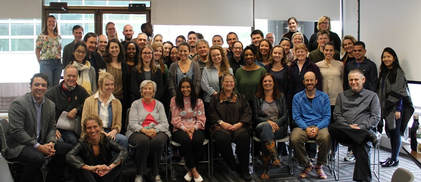
DATE: October 13-14, 2018
LOCATION: Church Center, New York City
Approximately 80 people participated in the “2018 Humanitarian Disarmament Forum: Humanitarian Disarmament Tools,” the seventh annual “Forum” that gathered members of the non-governmental humanitarian disarmament community to examine opportunities and challenges facing their common work and facilitate a cross-cutting discussion among different campaigns and efforts. A special emphasis was placed on exploring the wide range of tools available to the humanitarian disarmament community (see agenda).
The Forum on the Arms Trade partnered with the Center for Civilians in Conflict (CIVIC) to co-host the 2018 Humanitarian Disarmament Forum, and co-funded it together with contributions from Human Rights Watch, Humanity & Inclusion, and PAX.
LOCATION: Church Center, New York City
Approximately 80 people participated in the “2018 Humanitarian Disarmament Forum: Humanitarian Disarmament Tools,” the seventh annual “Forum” that gathered members of the non-governmental humanitarian disarmament community to examine opportunities and challenges facing their common work and facilitate a cross-cutting discussion among different campaigns and efforts. A special emphasis was placed on exploring the wide range of tools available to the humanitarian disarmament community (see agenda).
The Forum on the Arms Trade partnered with the Center for Civilians in Conflict (CIVIC) to co-host the 2018 Humanitarian Disarmament Forum, and co-funded it together with contributions from Human Rights Watch, Humanity & Inclusion, and PAX.
ANNUAL CONFERENCE:
Taking Aim: A Closer Look at the Global Arms Trade
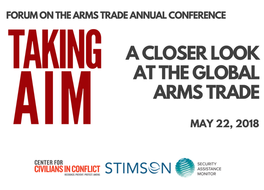
DATE: May 22, 2018
TIME: 11:30 AM - 6:30 PM
LOCATION: Stimson Center, 1211 Connecticut Ave NW, 8th Floor, Washington, DC 20036
The inaugural Forum on the Arms Trade annual conference, "Taking Aim: A Closer Look at the Global Arms Trade," was a half-day event held on May 22, 2018 at the Stimson Center.
Video of the conference is available below and at https://youtu.be/_ID-CYWUooA Photos are available here.
Senator Chris Murphy's keynote remarks begin at 1:00:55 in the video, during which he discussed a range of issues related to the arms trade, Yemen, and gun violence.
The first panel, "Living with the Arms Trade: Perspective from Conflict Area" (at 10:00 in the video, and then restarting at 1:34:00) featured:
Experts listed by the Forum on the Arms Trade will continue to be a resource on these and many issues. You can find out more about them here. If you are not already on the Forum's newsletter list, you may be added shortly. If you would rather not be included in those communications (approximately 3-4 emails per month), please feel free to email me directly to opt out.
The conference was co-hosted by the Stimson Center, Center for Civilians in Conflict, and the Security Assistance Monitor.
TIME: 11:30 AM - 6:30 PM
LOCATION: Stimson Center, 1211 Connecticut Ave NW, 8th Floor, Washington, DC 20036
The inaugural Forum on the Arms Trade annual conference, "Taking Aim: A Closer Look at the Global Arms Trade," was a half-day event held on May 22, 2018 at the Stimson Center.
Video of the conference is available below and at https://youtu.be/_ID-CYWUooA Photos are available here.
Senator Chris Murphy's keynote remarks begin at 1:00:55 in the video, during which he discussed a range of issues related to the arms trade, Yemen, and gun violence.
The first panel, "Living with the Arms Trade: Perspective from Conflict Area" (at 10:00 in the video, and then restarting at 1:34:00) featured:
- Radhya Almutawakel, Chairperson of Mwatana Organization for Human Rights (Yemen) - see recent annual report
- John Ismay, Conflict Reporter, New York Times; former U.S. Navy Explosive Ordnance Disposal (EOD) Officer - see article today on firearms export change
- Andrea Prasow, Deputy Washington Director, Human Rights Watch - see Afghanistan video and investigation discussed during conference
- Rahma A. Hussein (moderator), Legal Fellow, Counterterrorism, Armed Conflict and Human Rights Project, Columbia Law School - see related Perspective from Impacted Countries series
- Michael F. Miller, Acting Deputy Assistant Secretary, Bureau of Political-Military Affairs, U.S. Department of State - see new conventional arms transfer policy and firearms export regulations discussed (see also related Forum on the arms trade resources here and here)
- Shannon N. Green, Senior Director of Programs, Center for Civilians in Conflict (CIVIC); former Senior Director for Global Engagement, National Security Council - see CIVIC/Stimson report"With Great Power: Modifying US Arms Sales to Reduce Civilian Harm"
- Stephen Watts, Senior Political Scientist, RAND Corporation - discussed research on the risk associated with and effectiveness of security assistance
- Colby Goodman (moderator), Director, Security Assistance Monitor - see the website and related database for multiple resources.
Experts listed by the Forum on the Arms Trade will continue to be a resource on these and many issues. You can find out more about them here. If you are not already on the Forum's newsletter list, you may be added shortly. If you would rather not be included in those communications (approximately 3-4 emails per month), please feel free to email me directly to opt out.
The conference was co-hosted by the Stimson Center, Center for Civilians in Conflict, and the Security Assistance Monitor.
Jobs, Security, and Human Rights: Striking a Balance in U.S. Arms Export Policy
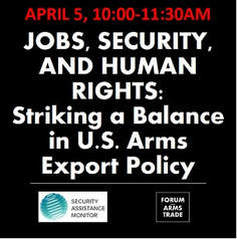
DATE: Thursday, April 5, 2018
TIME: 10:00 AM -11:30 AM (90 minutes)
LOCATION: Center for International Policy, 2000 M Street NW, Basement Conf. Room A, Washington, DC 20036C, 20036
Join leading experts in this event, which will seek to answer two main questions: 1) Are arms exports the best way to create jobs in the United States?; and 2) How should the administration and the Congress balance economic, strategic, and human rights factors to ensure that U.S. arms exports are serving U.S. and global security interests?
Authors of two recent research reports will discuss relevant findings as part of the discussion. See CIVIC/Stimson's "With Great Power: Modifying US Arms Sales to Reduce Civilian Harm," and Security Assistance Monitor's "Trends in Major U.S. Arms Sales in 2017: A Comparison of the Obama and Trump Administrations."
This was co-hosted by the Security Assistance Monitor and Forum on the Arms Trade. See video below.
Featuring:
William Hartung, Director, Arms and Security Project, Center for International Policy
Rachel Stohl, Managing Director, Stimson Center
Veronique de Rugy, Senior Research Fellow, Mercatus Center, George Mason University
Respondent: Aaron Mehta, Senior Pentagon Correspondent, Defense News
TIME: 10:00 AM -11:30 AM (90 minutes)
LOCATION: Center for International Policy, 2000 M Street NW, Basement Conf. Room A, Washington, DC 20036C, 20036
Join leading experts in this event, which will seek to answer two main questions: 1) Are arms exports the best way to create jobs in the United States?; and 2) How should the administration and the Congress balance economic, strategic, and human rights factors to ensure that U.S. arms exports are serving U.S. and global security interests?
Authors of two recent research reports will discuss relevant findings as part of the discussion. See CIVIC/Stimson's "With Great Power: Modifying US Arms Sales to Reduce Civilian Harm," and Security Assistance Monitor's "Trends in Major U.S. Arms Sales in 2017: A Comparison of the Obama and Trump Administrations."
This was co-hosted by the Security Assistance Monitor and Forum on the Arms Trade. See video below.
Featuring:
William Hartung, Director, Arms and Security Project, Center for International Policy
Rachel Stohl, Managing Director, Stimson Center
Veronique de Rugy, Senior Research Fellow, Mercatus Center, George Mason University
Respondent: Aaron Mehta, Senior Pentagon Correspondent, Defense News
Tackling Corruption in the Arms Trade
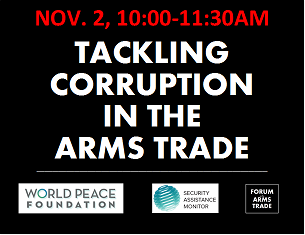
DATE: Thursday, November 2 2017
TIME: 10:00-11:30AM
LOCATION: Center for International Policy
2000 M St NW, Basement Conference Room A,
Washington DC, 20036
This event has occurred. Check out these key resources:
As the Trump Administration seeks record U.S. arms sales and renewed military engagement in places such as Afghanistan, there are increased risks of corruption undermining U.S. foreign policy and national security goals. Globally, the arms trade is highly prone to corruption, and there have been several high-profile cases in U.S. courts of bribery in the defense sector.
While U.S. law enforcement is increasing its efforts under the Foreign Corrupt Practices Act, it appears U.S. regulators are weakening some key anti-corruption measures. This will put extra pressure on the U.S. officials and companies that are attempting to address domestic and foreign corruption as well as to ensure weapons transfers are not diverted to criminal or terrorist organizations.
Experts with experience in U.S. export enforcement, tracking the U.S. and global arms trade and corruption, and U.S. military engagement in Afghanistan will discuss these challenges and trends. They will also offer new recommendations on what can be done to counter corruption in the arms trade.
Speakers:
This event is co-hosted by the World Peace Foundation, Security Assistance Monitor, and the Forum on the Arms Trade.
TIME: 10:00-11:30AM
LOCATION: Center for International Policy
2000 M St NW, Basement Conference Room A,
Washington DC, 20036
This event has occurred. Check out these key resources:
- Steve Pelak presentation - A Few Observations on Part 130 of the ITAR
- Compendium of Arms Trade Corruption - including interactive map
- Photos
As the Trump Administration seeks record U.S. arms sales and renewed military engagement in places such as Afghanistan, there are increased risks of corruption undermining U.S. foreign policy and national security goals. Globally, the arms trade is highly prone to corruption, and there have been several high-profile cases in U.S. courts of bribery in the defense sector.
While U.S. law enforcement is increasing its efforts under the Foreign Corrupt Practices Act, it appears U.S. regulators are weakening some key anti-corruption measures. This will put extra pressure on the U.S. officials and companies that are attempting to address domestic and foreign corruption as well as to ensure weapons transfers are not diverted to criminal or terrorist organizations.
Experts with experience in U.S. export enforcement, tracking the U.S. and global arms trade and corruption, and U.S. military engagement in Afghanistan will discuss these challenges and trends. They will also offer new recommendations on what can be done to counter corruption in the arms trade.
Speakers:
- Sam Perlo-Freeman, Program Manager, Global Arms and Corruption, World Peace Foundation
- Steve Pelak, Partner, Holland and Hart; former Department of Justice National Coordinator Export Control/Economic Sanctions Enforcement
- Lt. Col. (ret.) Jodi Vittori, Senior Policy Advisor, Global Witness; former member of NATO counter-corruption task force in Afghanistan
- Colby Goodman, Director, Security Assistance Monitor (moderator)
This event is co-hosted by the World Peace Foundation, Security Assistance Monitor, and the Forum on the Arms Trade.
Media Briefing – Trends in U.S. Foreign Military Training and Report Pre-Release Information - May 3
Where: Teleconference, Washington-DC based
When: Wednesday, 11:30 AM-12:30 PM (US Eastern Daylight Time)
This event has occurred. Read the report here.
The Forum on the Arms Trade invites media to a private teleconference briefing on Wednesday, May 3 at 11:30 AM EDT to discuss new, global trends in U.S. foreign military training in connection with the Security Assistance Monitor’s (SAM) upcoming report launch. Participants will also receive an overview of SAM’s newly designed Military Trainees database.
The United States significantly increased foreign military training in FY 2015, growing from 56,346 trainees in FY 2014 to 79,865 trainees in FY 2015, to address a wide range of shared security threats. This increase was driven largely by a growth in U.S. military training to some countries in Africa, Eurasia, and the Middle East. There was also a jump in U.S. training focused on peacekeeping, counter-narcotics, operating U.S. weapons systems, cyber security, maritime operations, and rule of law.
Experts will provide details on why the U.S. government increased training on these issues. They will also describe how the Trump administration’s proposed cuts to peacekeeping, weapon’s maintenance programs, counter-narcotics, and other security aid efforts could change future U.S. security assistance efforts.
Featuring:
The Forum on the Arms Trade hosts media briefings designed to give journalists an opportunity to discuss hot topics and get a preview of upcoming research findings. Briefings feature 2-3 Forum on the Arms Trade-listed experts who will speak for no more than 20 minutes total and then field questions for the remainder of the hour. In this instance, comments from the briefing are embargoed until the launch of the featured report at 12:01 AM on May 4.
Experts listed by the Forum do not necessarily endorse the views and opinions of others. The briefing is not an endorsement of the SAM report, but rather an opportunity for media to receive information and ask questions.
When: Wednesday, 11:30 AM-12:30 PM (US Eastern Daylight Time)
This event has occurred. Read the report here.
The Forum on the Arms Trade invites media to a private teleconference briefing on Wednesday, May 3 at 11:30 AM EDT to discuss new, global trends in U.S. foreign military training in connection with the Security Assistance Monitor’s (SAM) upcoming report launch. Participants will also receive an overview of SAM’s newly designed Military Trainees database.
The United States significantly increased foreign military training in FY 2015, growing from 56,346 trainees in FY 2014 to 79,865 trainees in FY 2015, to address a wide range of shared security threats. This increase was driven largely by a growth in U.S. military training to some countries in Africa, Eurasia, and the Middle East. There was also a jump in U.S. training focused on peacekeeping, counter-narcotics, operating U.S. weapons systems, cyber security, maritime operations, and rule of law.
Experts will provide details on why the U.S. government increased training on these issues. They will also describe how the Trump administration’s proposed cuts to peacekeeping, weapon’s maintenance programs, counter-narcotics, and other security aid efforts could change future U.S. security assistance efforts.
Featuring:
- Colby Goodman Director, Security Assistance Monitor
- Adam Isacson Senior Associate for Defense Oversight, Washington Office on Latin America
- Jeff Abramson (moderator) Senior Fellow, Arms Control Association (coordinator, Forum on the Arms Trade)
The Forum on the Arms Trade hosts media briefings designed to give journalists an opportunity to discuss hot topics and get a preview of upcoming research findings. Briefings feature 2-3 Forum on the Arms Trade-listed experts who will speak for no more than 20 minutes total and then field questions for the remainder of the hour. In this instance, comments from the briefing are embargoed until the launch of the featured report at 12:01 AM on May 4.
Experts listed by the Forum do not necessarily endorse the views and opinions of others. The briefing is not an endorsement of the SAM report, but rather an opportunity for media to receive information and ask questions.
EVENT: Corruption, Jobs, and the Arms Trade:
Indefensible Book Launch and Panel Discussion
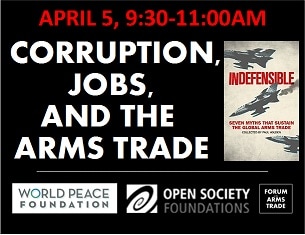
DATE: Wednesday, April 5, 2017
TIME: 9:30-11:00AM (light breakfast prior to event)
LOCATION: The Open Society Foundations,
1730 Pennsylvania Ave, NW, 7th Floor,
Washington DC, 20006
This event has occurred. Audio available here. See photos here.
Buoyed by promises of a massive U.S. military buildup, arms industry stocks have skyrocketed since the 2016 presidential election. The proposed increases in defense spending have been sold to the American public as a win-win policy: more military spending not only benefits national security, but will help drive economic growth and job creation.
Indefensible: Seven Myths that Sustain the Global Arms Trade, a book and web project of the World Peace Foundation at Tufts, critically examines the U.S. and global arms industry--in particular the public corruption it so often engenders at home and abroad. Bringing together a experts and activists, Indefensible deploys statistics, case studies, and evidence to pierce common beliefs about the arms trade. Far from protecting the United States or driving job creation, this collective finds that poorly overseen and bloated military spending actually undermines security and stifles economic growth.
An expert panel discusses the risks and tradeoffs of President Trump’s proposed military buildup and budget rebalancing away from international assistance and foreign aid, not just for American democracy but also for the U.S. economy and national security.
Speakers:
*Member of the Indefensible collective.
This event was co-hosted by the World Peace Foundation, Open Society Foundations and the Forum on the Arms Trade.
TIME: 9:30-11:00AM (light breakfast prior to event)
LOCATION: The Open Society Foundations,
1730 Pennsylvania Ave, NW, 7th Floor,
Washington DC, 20006
This event has occurred. Audio available here. See photos here.
Buoyed by promises of a massive U.S. military buildup, arms industry stocks have skyrocketed since the 2016 presidential election. The proposed increases in defense spending have been sold to the American public as a win-win policy: more military spending not only benefits national security, but will help drive economic growth and job creation.
Indefensible: Seven Myths that Sustain the Global Arms Trade, a book and web project of the World Peace Foundation at Tufts, critically examines the U.S. and global arms industry--in particular the public corruption it so often engenders at home and abroad. Bringing together a experts and activists, Indefensible deploys statistics, case studies, and evidence to pierce common beliefs about the arms trade. Far from protecting the United States or driving job creation, this collective finds that poorly overseen and bloated military spending actually undermines security and stifles economic growth.
An expert panel discusses the risks and tradeoffs of President Trump’s proposed military buildup and budget rebalancing away from international assistance and foreign aid, not just for American democracy but also for the U.S. economy and national security.
Speakers:
- Bridget Conley*, Research Director, World Peace Foundation and Assistant Research Professor, Fletcher School of Law and Diplomacy
- William Hartung*, Director, Arms and Security Project, Center for International Policy
- Sarah Chayes, Senior Fellow, Democracy and Rule of Law Program, Carnegie Endowment for International Peace
- Mark Thompson, National Security Analyst, Project on Government Oversight
*Member of the Indefensible collective.
This event was co-hosted by the World Peace Foundation, Open Society Foundations and the Forum on the Arms Trade.
EVENT: The Global Arms Trade: Assessing Trends and Future Outlook
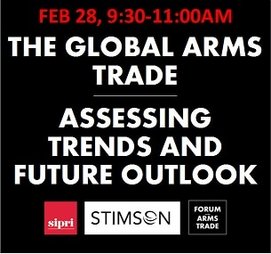
DATE: Tuesday, February 28, 2017
TIME: 9:30-11:00 AM
LOCATION: The Stimson Center, 1211 Connecticut Ave NW, 8th Floor,
Washington DC, 20036
This event has occurred. Jump to video.
Changing political landscapes in the United States, Europe, and Russia continue to drive global arms sales. As priorities shift, threats emerge, and the global economy fluctuates, the global arms market responds. The Stockholm International Peace Research Institute (SIPRI) annually releases data on international arms transfers. SIPRI’s renowned arms transfers database identifies top exporters and importers of conventional weapons and provides insights into the resulting trends as they relate to global peace, security and development.
Please join the Stimson Center on February 28, 2017 for an expert discussion on SIPRI’s most recent data on global arms transfers. Panelists will discuss trends and outlooks for global arms sales that could impact U.S. national security and foreign policy. This event is co-hosted by SIPRI, the Forum on the Arms Trade, and the Stimson Center.
Featuring:
Aude Fleurant, Director, Arms and Military Expenditure Programme, SIPRI
Joe Gould, Congress reporter, Defense News
Rachel Stohl, Senior Associate, Stimson Center
For news and information on the event, follow: @StimsonCenter @ForumArmsTrade @SIPRIorg @jeffabramson @rachelstohl
TIME: 9:30-11:00 AM
LOCATION: The Stimson Center, 1211 Connecticut Ave NW, 8th Floor,
Washington DC, 20036
This event has occurred. Jump to video.
Changing political landscapes in the United States, Europe, and Russia continue to drive global arms sales. As priorities shift, threats emerge, and the global economy fluctuates, the global arms market responds. The Stockholm International Peace Research Institute (SIPRI) annually releases data on international arms transfers. SIPRI’s renowned arms transfers database identifies top exporters and importers of conventional weapons and provides insights into the resulting trends as they relate to global peace, security and development.
Please join the Stimson Center on February 28, 2017 for an expert discussion on SIPRI’s most recent data on global arms transfers. Panelists will discuss trends and outlooks for global arms sales that could impact U.S. national security and foreign policy. This event is co-hosted by SIPRI, the Forum on the Arms Trade, and the Stimson Center.
Featuring:
Aude Fleurant, Director, Arms and Military Expenditure Programme, SIPRI
Joe Gould, Congress reporter, Defense News
Rachel Stohl, Senior Associate, Stimson Center
For news and information on the event, follow: @StimsonCenter @ForumArmsTrade @SIPRIorg @jeffabramson @rachelstohl
EVENT: What to Control: Regulating U.S. Sales of Private Military Contractors Abroad
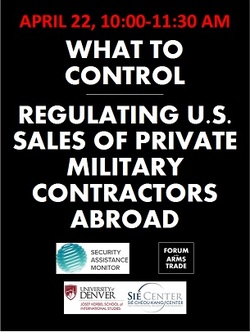
DATE: Friday, April 22, 2016
TIME: 10:00-11:30 AM
LOCATION: Open Societies Foundation, 1730 Pennsylvania Ave, #700
Washington DC, 20036
This event has occurred.
In June 2015, the Obama Administration published a proposed rule that seeks to reduce oversight of many types of U.S. Private Security Contractor (PSC) services abroad as part of its “Export Control Reform Initiative.” While the rule may fit within the initiative’s goals of focusing U.S. oversight on items and services that provide a critical military or intelligence advantage, it has raised many questions. What are the range of services PSCs provide to foreign governments directly? Would the U.S. lose oversight of services that could harm U.S. interests? Please join us for a conversation on this important topic.
This event is hosted in partnership with the Security Assistance Monitor, Forum on the Arms Trade and the University of Denver Josef Korbel School of International Studies' Sié Chéou-Kang Center for International Security & Diplomacy.
Featuring:
Deborah Avant, Chair and Director, Sié Chéou-Kang Center for International Security and Diplomacy, Josef Korbel School of International Studies, University of Denver
Chris Mayer, Director, Armed Contingency Contractor Policies and Programs, Office of the Deputy Assistant Secretary of Defense
Private Security Company Representative (Invited)
Colby Goodman, Director, Security Assistance Monitor, Center for International Policy (moderator)
TIME: 10:00-11:30 AM
LOCATION: Open Societies Foundation, 1730 Pennsylvania Ave, #700
Washington DC, 20036
This event has occurred.
In June 2015, the Obama Administration published a proposed rule that seeks to reduce oversight of many types of U.S. Private Security Contractor (PSC) services abroad as part of its “Export Control Reform Initiative.” While the rule may fit within the initiative’s goals of focusing U.S. oversight on items and services that provide a critical military or intelligence advantage, it has raised many questions. What are the range of services PSCs provide to foreign governments directly? Would the U.S. lose oversight of services that could harm U.S. interests? Please join us for a conversation on this important topic.
This event is hosted in partnership with the Security Assistance Monitor, Forum on the Arms Trade and the University of Denver Josef Korbel School of International Studies' Sié Chéou-Kang Center for International Security & Diplomacy.
Featuring:
Deborah Avant, Chair and Director, Sié Chéou-Kang Center for International Security and Diplomacy, Josef Korbel School of International Studies, University of Denver
Chris Mayer, Director, Armed Contingency Contractor Policies and Programs, Office of the Deputy Assistant Secretary of Defense
Private Security Company Representative (Invited)
Colby Goodman, Director, Security Assistance Monitor, Center for International Policy (moderator)
EVENT: Global Military Spending and the Arms Trade: Trends & Implications
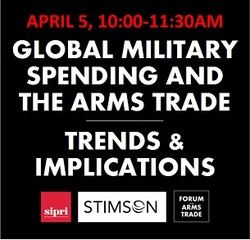
DATE: Tuesday, April 5, 2016
TIME: 10:00-11:30 AM
LOCATION: The Stimson Center, 1211 Connecticut Ave NW, 8th Floor,
Washington DC, 20036
This event has occurred. Jump to video.
Global military expenditure and the international arms trade are driven by changing economic circumstances, shifting priorities, emerging security threats, and regional and international instability. Examining the recent trends in the global arms market and in the budgets of government militaries allows us to identify potential hot-spots and future areas of concern.
Each year, the Stockholm International Peace Research Institute (SIPRI) releases data on current trends in military spending and international arms transfers. SIPRI’s Military Expenditure Database contains information on defense spending by almost all countries, and monitors broader trends that emerge over time. Likewise, SIPRI’s arms transfers database identifies top exporters and importers of conventional weapons. Drawn from open source documents, SIPRI’s databases provides analysis on the economic, political and security drivers that influence military spending around the world and offers insights into their implications for global peace, security and development.
Please join us on April 5, 2016 to discuss the findings of SIPRI’s most recent data and the potential implications on U.S. national security and foreign policy. This event will present major findings and key trends in global military expenditures and international arms sales.
This event is co-hosted by SIPRI, the Forum on the Arms Trade and the Stimson Center.
Featuring:
Aude Fleurant, Director, Arms and Military Expenditure Programme, SIPRI
Gordon Adams, Distinguished Fellow, Stimson Center
Aaron Mehta, Senior Pentagon Correspondent, Defense News
Rachel Stohl (moderator), Senior Associate, Stimson Center
For news and information on the event, follow: @StimsonCenter @ForumArmsTrade @SIPRIorg @jeffabramson @rachelstohl
TIME: 10:00-11:30 AM
LOCATION: The Stimson Center, 1211 Connecticut Ave NW, 8th Floor,
Washington DC, 20036
This event has occurred. Jump to video.
Global military expenditure and the international arms trade are driven by changing economic circumstances, shifting priorities, emerging security threats, and regional and international instability. Examining the recent trends in the global arms market and in the budgets of government militaries allows us to identify potential hot-spots and future areas of concern.
Each year, the Stockholm International Peace Research Institute (SIPRI) releases data on current trends in military spending and international arms transfers. SIPRI’s Military Expenditure Database contains information on defense spending by almost all countries, and monitors broader trends that emerge over time. Likewise, SIPRI’s arms transfers database identifies top exporters and importers of conventional weapons. Drawn from open source documents, SIPRI’s databases provides analysis on the economic, political and security drivers that influence military spending around the world and offers insights into their implications for global peace, security and development.
Please join us on April 5, 2016 to discuss the findings of SIPRI’s most recent data and the potential implications on U.S. national security and foreign policy. This event will present major findings and key trends in global military expenditures and international arms sales.
This event is co-hosted by SIPRI, the Forum on the Arms Trade and the Stimson Center.
Featuring:
Aude Fleurant, Director, Arms and Military Expenditure Programme, SIPRI
Gordon Adams, Distinguished Fellow, Stimson Center
Aaron Mehta, Senior Pentagon Correspondent, Defense News
Rachel Stohl (moderator), Senior Associate, Stimson Center
For news and information on the event, follow: @StimsonCenter @ForumArmsTrade @SIPRIorg @jeffabramson @rachelstohl
EVENT: Crisis in Yemen - Humanitarian and Security Consequences of Military Support to the Region
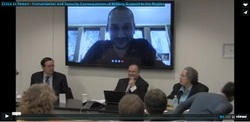 Click to launch video in a new window.
Click to launch video in a new window.
DATE: Tuesday, October 20, 2015
TIME: 10:00-11:30AM
LOCATION: The Stimson Center, 1211 Connecticut Ave NW, 8th Floor,
Washington DC, 20036
This event has occurred. See resources:
A humanitarian catastrophe is unfolding in Yemen, one of the Middle East's poorest nations. The United States and other Western powers have supported the Saudi-led coalition as it battles Yemen's Houthis, promising more assistance in the future but at the risk of strengthening forces such as Al Qaeda in the Arabian Peninsula. An expert panel will look at the situation in Yemen today and the politics and consequences of adding additional military equipment to the conflict.
William Hartung, Director, Arms and Security Project, Center for International Policy and advisor to Security Assistance Monitor will review the history of US weapons and security assistance to the region, and discuss the likely impact of additional supplies that are in process or under consideration.
Martin Butcher, Policy Advisor, Arms and Conflict, Oxfam International, will discuss how the United Kingdom and other European countries have supplied military assistance to the region and the ongoing public reaction to plans to increase that assistance in light of human rights concerns.
Tariq Riebl, Response and Resilience Team Program Coordinator, Oxfam, will join via skype
to discuss the humanitarian situation in Yemen, drawing upon his work on the ground coordinating relief efforts.
This event is co-hosted by the Forum on the Arms Trade and the Security Assistance Monitor.
Media are especially encouraged to attend.
Featuring:
William Hartung, Director, Arms and Security Project, Center for International Policy
Martin Butcher, Policy Advisor, Arms and Conflict, Oxfam International
Tariq Riebl, Response and Resilience Team Program Coordinator, Oxfam
Moderator: Natalie Goldring, Adjunct Professor and Senior Fellow, Security Studies Program, Georgetown University
TIME: 10:00-11:30AM
LOCATION: The Stimson Center, 1211 Connecticut Ave NW, 8th Floor,
Washington DC, 20036
This event has occurred. See resources:
- Findings and Comments (pdf)
- U.S. Arms Transfers to the Middle East: Promoting Stability or Fueling Conflict? - William Hartung's commentary (blog)
- Video of the event - link
A humanitarian catastrophe is unfolding in Yemen, one of the Middle East's poorest nations. The United States and other Western powers have supported the Saudi-led coalition as it battles Yemen's Houthis, promising more assistance in the future but at the risk of strengthening forces such as Al Qaeda in the Arabian Peninsula. An expert panel will look at the situation in Yemen today and the politics and consequences of adding additional military equipment to the conflict.
William Hartung, Director, Arms and Security Project, Center for International Policy and advisor to Security Assistance Monitor will review the history of US weapons and security assistance to the region, and discuss the likely impact of additional supplies that are in process or under consideration.
Martin Butcher, Policy Advisor, Arms and Conflict, Oxfam International, will discuss how the United Kingdom and other European countries have supplied military assistance to the region and the ongoing public reaction to plans to increase that assistance in light of human rights concerns.
Tariq Riebl, Response and Resilience Team Program Coordinator, Oxfam, will join via skype
to discuss the humanitarian situation in Yemen, drawing upon his work on the ground coordinating relief efforts.
This event is co-hosted by the Forum on the Arms Trade and the Security Assistance Monitor.
Media are especially encouraged to attend.
Featuring:
William Hartung, Director, Arms and Security Project, Center for International Policy
Martin Butcher, Policy Advisor, Arms and Conflict, Oxfam International
Tariq Riebl, Response and Resilience Team Program Coordinator, Oxfam
Moderator: Natalie Goldring, Adjunct Professor and Senior Fellow, Security Studies Program, Georgetown University
Media Briefing - Middle East Security Assistance and Report Pre-Release Information - May 19
Where: Teleconference, Washington-DC based
When: Tuesday May 19, 11:00 AM-noon (US Eastern Daylight Time) – RSVP required to receive call-in number, contact jeff at ForumArmsTrade [dot] org
This event has occurred.
The Forum on the Arms Trade invites media to a teleconference briefing on Tuesday, May 19 at 11:00 AM EDT to discuss arms trade and security assistance issues related to the Middle East, and receive an embargoed briefing on the pending Project on the Middle East (POMED) report The Federal Budget and Appropriations for Fiscal Year 2016: Democracy, Governance, and Human Rights in the Middle East (see also public May 21 -- details here).
As a region mired in multiple conflicts—protracted civil wars in Syria and Libya, the rise of the Islamic State, and surges of conflict and violence in Yemen—experts will discuss U.S. funding and assistance for democracy and governance in the Middle East, the congressional appropriations process, and implications for U.S. policy in the Middle East during a turbulent time.
Featuring:
Cole Bockenfeld
Advocacy Director, Project on Middle East Democracy – report co-author
Todd Ruffner
Advocacy Associate, Project on Middle East Democracy
Jeff Abramson (moderator)
Founder, Forum on the Arms Trade
The Forum on the Arms Trade hosts media briefings designed to give journalists an opportunity to discuss hot topics and get a preview of upcoming research findings. Briefings feature 2-3 Forum on the Arms Trade-listed experts who will speak for no more than 20 minutes total and then field questions for the remainder of the hour. In this instance, comments from the briefing are embargoed until the launch of the featured report at 2PM on May 20.
Experts listed by the Forum do not necessarily endorse the views and opinions of others. The briefing is not an endorsement of the POMED report, but rather an opportunity for media to receive information and ask questions.
When: Tuesday May 19, 11:00 AM-noon (US Eastern Daylight Time) – RSVP required to receive call-in number, contact jeff at ForumArmsTrade [dot] org
This event has occurred.
The Forum on the Arms Trade invites media to a teleconference briefing on Tuesday, May 19 at 11:00 AM EDT to discuss arms trade and security assistance issues related to the Middle East, and receive an embargoed briefing on the pending Project on the Middle East (POMED) report The Federal Budget and Appropriations for Fiscal Year 2016: Democracy, Governance, and Human Rights in the Middle East (see also public May 21 -- details here).
As a region mired in multiple conflicts—protracted civil wars in Syria and Libya, the rise of the Islamic State, and surges of conflict and violence in Yemen—experts will discuss U.S. funding and assistance for democracy and governance in the Middle East, the congressional appropriations process, and implications for U.S. policy in the Middle East during a turbulent time.
Featuring:
Cole Bockenfeld
Advocacy Director, Project on Middle East Democracy – report co-author
Todd Ruffner
Advocacy Associate, Project on Middle East Democracy
Jeff Abramson (moderator)
Founder, Forum on the Arms Trade
The Forum on the Arms Trade hosts media briefings designed to give journalists an opportunity to discuss hot topics and get a preview of upcoming research findings. Briefings feature 2-3 Forum on the Arms Trade-listed experts who will speak for no more than 20 minutes total and then field questions for the remainder of the hour. In this instance, comments from the briefing are embargoed until the launch of the featured report at 2PM on May 20.
Experts listed by the Forum do not necessarily endorse the views and opinions of others. The briefing is not an endorsement of the POMED report, but rather an opportunity for media to receive information and ask questions.
EVENT: Assessing Proposed U.S. Security Assistance to Africa, Latin America & Middle East
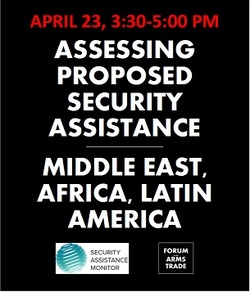
DATE: Thursday, April 23, 2015
TIME: 3:30 - 5:00 PM
LOCATION: Russell Senate Office Building - Room 385
This event has occurred. See factsheets:
With the proliferation of armed conflict in the Middle East, continued extremist violence in Africa, and ongoing struggles to improve stability in Latin America, the United States relies upon the provision of security assistance as a key tool to address real threats and challenges.
The latest budget proposed by the Obama administration envisions significant expenditures for the provision of weapons, military and police aid, training programs, or other activities to countries in all three regions. What is being proposed for 2016? What impact is US security assistance likely to have, and what concerns still need to be addressed?
On April 23, regional experts will discuss these questions as they assess the diverse security needs and proposed US assistance to the Middle East, Africa, and Latin America.
This event is co-organized by the Forum on the Arms Trade and the Security Assistance Monitor, a project of the Center for International Policy. It is hosted with cooperation of the Congressional African Staff Association.
Featuring:
TIME: 3:30 - 5:00 PM
LOCATION: Russell Senate Office Building - Room 385
This event has occurred. See factsheets:
- The Obama Administration's FY 2016 Request for Security Assistance - contact Colby Goodman
- Defense Budget Programs That Provide Assistance To Foreign Countries - contact Adam Isacson
With the proliferation of armed conflict in the Middle East, continued extremist violence in Africa, and ongoing struggles to improve stability in Latin America, the United States relies upon the provision of security assistance as a key tool to address real threats and challenges.
The latest budget proposed by the Obama administration envisions significant expenditures for the provision of weapons, military and police aid, training programs, or other activities to countries in all three regions. What is being proposed for 2016? What impact is US security assistance likely to have, and what concerns still need to be addressed?
On April 23, regional experts will discuss these questions as they assess the diverse security needs and proposed US assistance to the Middle East, Africa, and Latin America.
This event is co-organized by the Forum on the Arms Trade and the Security Assistance Monitor, a project of the Center for International Policy. It is hosted with cooperation of the Congressional African Staff Association.
Featuring:
- Cole Bockenfeld, Advocacy Director, Project on Middle East Democracy (POMED)
- Adam Isacson, Senior Associate for Regional Security Policy, WOLA
- Theo Sitther, Legislative Secretary for Peacebuilding Policy, FCNL
- Colby Goodman (moderator), Senior Research Associate, Security Assistance Monitor
EVENT: Tracking Arms in Conflict - Lessons from Syria & Iraq
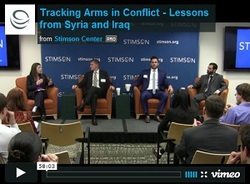 Video courtesy of the Stimson Center. Click to launch video in a new window.
Video courtesy of the Stimson Center. Click to launch video in a new window.
DATE: Tuesday, April 7, 2015
TIME: 11:00AM - noon
LOCATION: The Stimson Center, 1211 Connecticut Ave NW, 8th Floor,
Washington DC, 20036
This event has occurred. Jump to factsheet.
Identifying and tracking weapons being used in armed conflicts is a dangerous but vital task. At times this is done by investigators on the ground, but often relies on footage and other evidence viewed from afar. On April 7, experts will discuss how they are tracking weapons used in Syria and Iraq, and share some of their recent findings.
Jonah Leff, Director of Operations, Conflict Armament Research, will report on findings based on documentation of nearly 40,000 weapons and ammunition as part of field investigations and the new iTrace system. He'll discuss the prevalence of U.S. weapons found among Islamic State fighters; findings of newly manufactured Russian, Iranian, and Sudanese ammunition; evidence of supply to Syrian rebels from Saudi Arabia; and large scale industrial production and use of improvised explosive devices (IEDs) in Syria and Iraq.
Matt Schroeder, Senior Researcher, Small Arms Survey, will share examples of using YouTube and other footage to track the increasing complexity of use of MANPADS (aka shoulder-fired missiles) by fighters in the Middle East.
This event is co-hosted by the Forum on the Arms Trade and the Stimson Center and is the third in a Stimson series on missing and illicit weapons. Previous events were held on missing weapons in Libya and the risk of unauthorized retransfers.
Media are especially encouraged to attend to learn more about how this important work is done.
Featuring:
Jonah Leff, Director of Operations, Conflict Armament Research
Matt Schroeder, Senior Researcher, Small Arms Survey
Moderator: Rachel Stohl, Senior Associate, Managing Across Boundaries, Stimson Center
TIME: 11:00AM - noon
LOCATION: The Stimson Center, 1211 Connecticut Ave NW, 8th Floor,
Washington DC, 20036
This event has occurred. Jump to factsheet.
Identifying and tracking weapons being used in armed conflicts is a dangerous but vital task. At times this is done by investigators on the ground, but often relies on footage and other evidence viewed from afar. On April 7, experts will discuss how they are tracking weapons used in Syria and Iraq, and share some of their recent findings.
Jonah Leff, Director of Operations, Conflict Armament Research, will report on findings based on documentation of nearly 40,000 weapons and ammunition as part of field investigations and the new iTrace system. He'll discuss the prevalence of U.S. weapons found among Islamic State fighters; findings of newly manufactured Russian, Iranian, and Sudanese ammunition; evidence of supply to Syrian rebels from Saudi Arabia; and large scale industrial production and use of improvised explosive devices (IEDs) in Syria and Iraq.
Matt Schroeder, Senior Researcher, Small Arms Survey, will share examples of using YouTube and other footage to track the increasing complexity of use of MANPADS (aka shoulder-fired missiles) by fighters in the Middle East.
This event is co-hosted by the Forum on the Arms Trade and the Stimson Center and is the third in a Stimson series on missing and illicit weapons. Previous events were held on missing weapons in Libya and the risk of unauthorized retransfers.
Media are especially encouraged to attend to learn more about how this important work is done.
Featuring:
Jonah Leff, Director of Operations, Conflict Armament Research
Matt Schroeder, Senior Researcher, Small Arms Survey
Moderator: Rachel Stohl, Senior Associate, Managing Across Boundaries, Stimson Center
EVENT: Global Arms Trade, Recent Trends & Looking Ahead
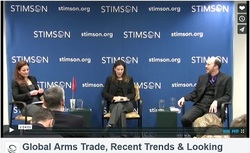 Video courtesy of the Stimson Center. Click to launch video in new window.
Video courtesy of the Stimson Center. Click to launch video in new window.
DATE: Monday, March 16, 2015
TIME: 10:00-11:30 AM
LOCATION: The Stimson Center, 1211 Connecticut Ave NW, 8th Floor,
Washington DC, 20036
This event has occurred.
On March 16, the Stockholm International Peace Research Institute (SIPRI) will release "Trends in international arms transfers, 2014." This annual report, drawn from the world's most detailed public database, identifies top exporters and importers of major conventional weapons as well as key regional arms transfer trends from 2010-2014. Dr. Aude Fleurant, Director of the Arms and Military Expenditure Programme, will present the report's major findings and answer questions in this on-the-record event co-hosted by the Forum on the Arms Trade and the Stimson Center.
Event panelists Jeff Abramson (Forum on the Arms Trade) and Rachel Stohl (Stimson Center) will also look ahead to discuss the prospects for greater responsibility and transparency in the global arms trade as the United States and other countries continue to grapple with whether and how to arm actors in ongoing conflicts in the Middle East, Eastern Europe, and Africa.
Featuring:
Aude Fleurant, Director, Arms and Military Expenditure Programme, SIPRI
Jeff Abramson, Founder, Forum on the Arms Trade
Moderator: Rachel Stohl, Senior Associate, Managing Across Boundaries, Stimson Center
TIME: 10:00-11:30 AM
LOCATION: The Stimson Center, 1211 Connecticut Ave NW, 8th Floor,
Washington DC, 20036
This event has occurred.
On March 16, the Stockholm International Peace Research Institute (SIPRI) will release "Trends in international arms transfers, 2014." This annual report, drawn from the world's most detailed public database, identifies top exporters and importers of major conventional weapons as well as key regional arms transfer trends from 2010-2014. Dr. Aude Fleurant, Director of the Arms and Military Expenditure Programme, will present the report's major findings and answer questions in this on-the-record event co-hosted by the Forum on the Arms Trade and the Stimson Center.
Event panelists Jeff Abramson (Forum on the Arms Trade) and Rachel Stohl (Stimson Center) will also look ahead to discuss the prospects for greater responsibility and transparency in the global arms trade as the United States and other countries continue to grapple with whether and how to arm actors in ongoing conflicts in the Middle East, Eastern Europe, and Africa.
Featuring:
Aude Fleurant, Director, Arms and Military Expenditure Programme, SIPRI
Jeff Abramson, Founder, Forum on the Arms Trade
Moderator: Rachel Stohl, Senior Associate, Managing Across Boundaries, Stimson Center


